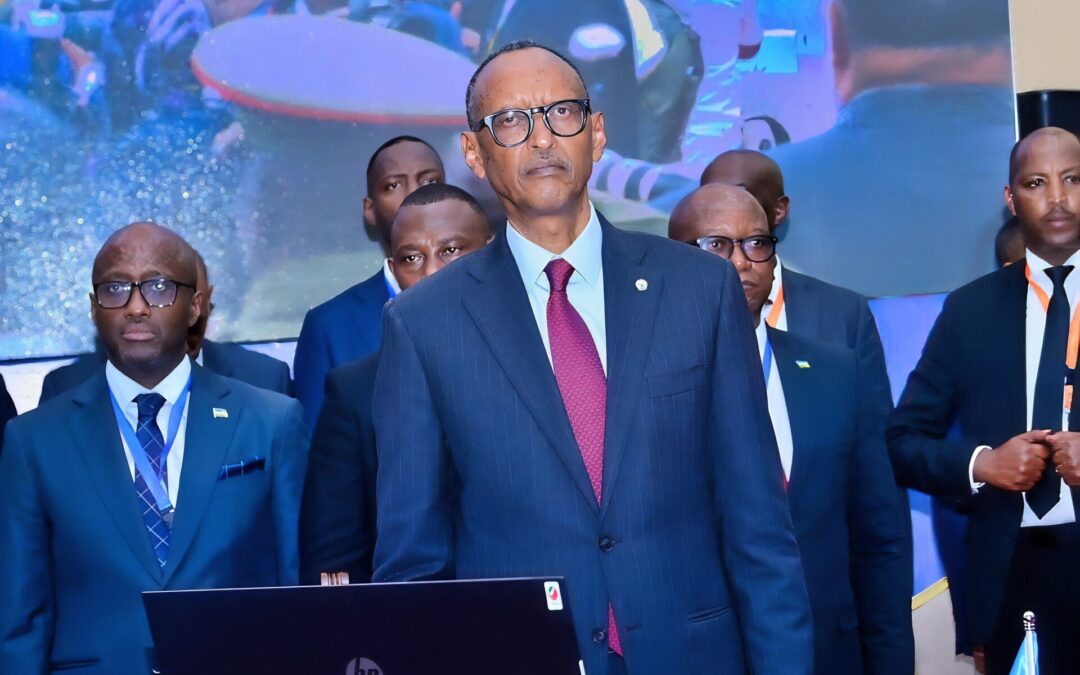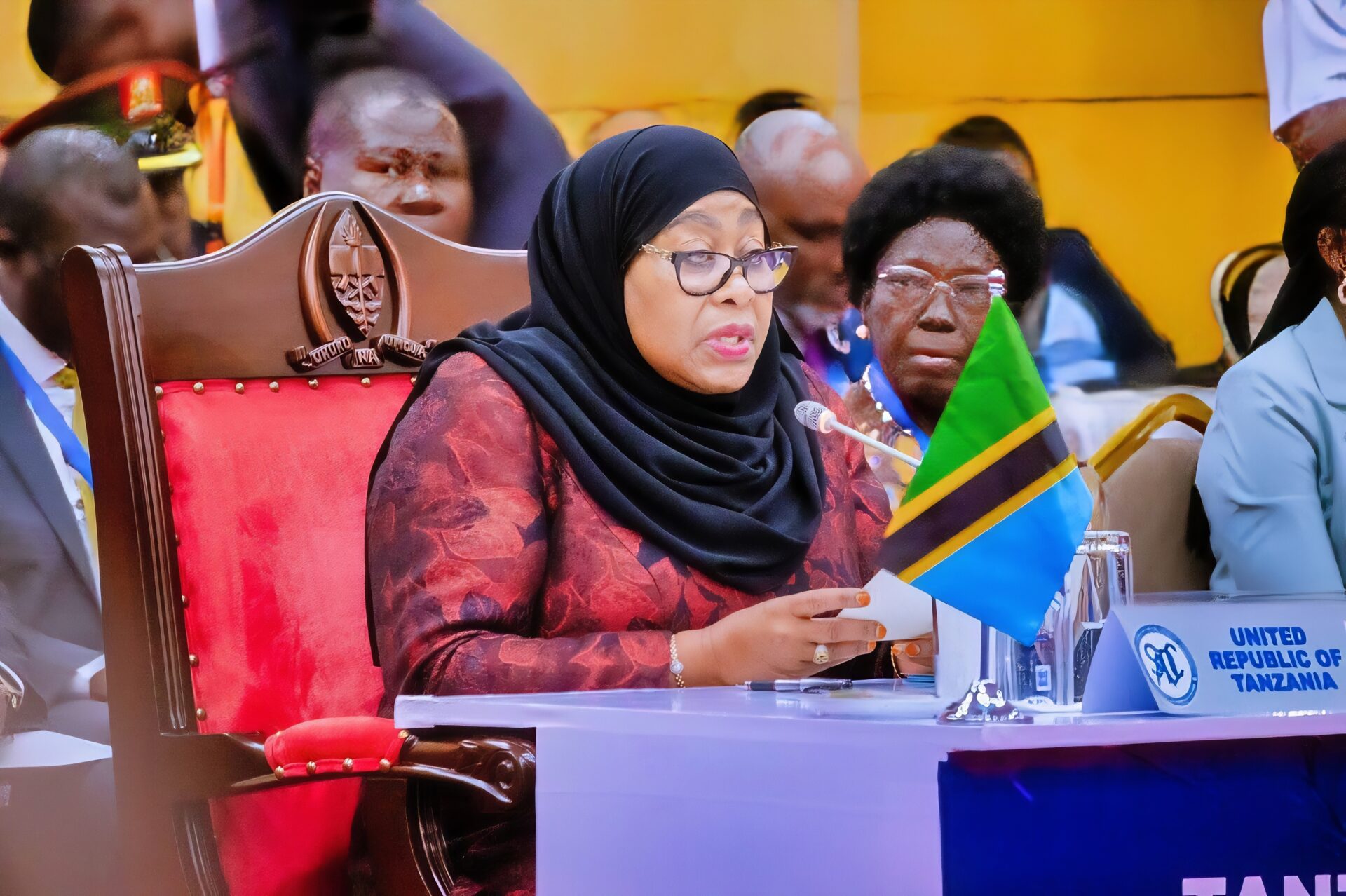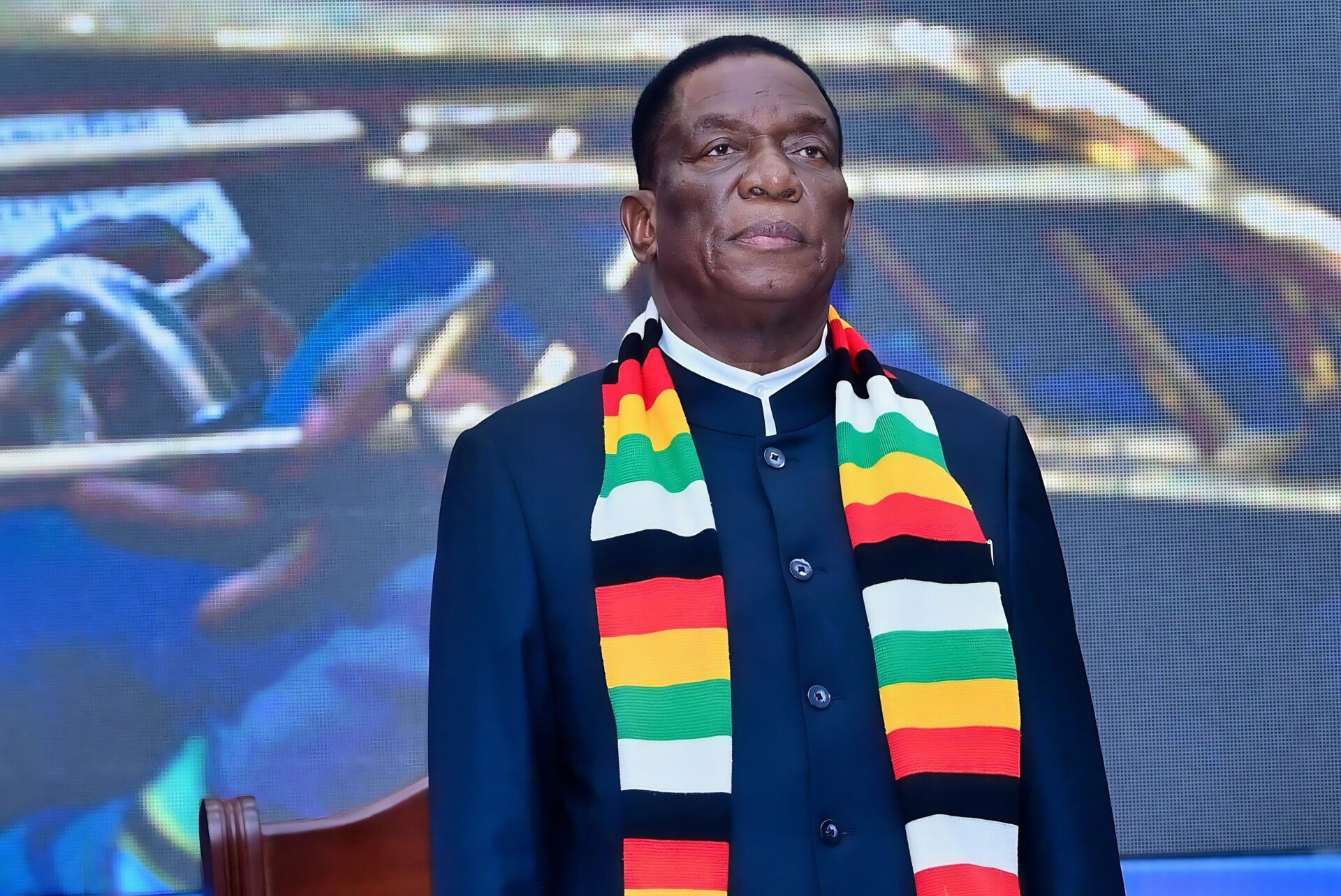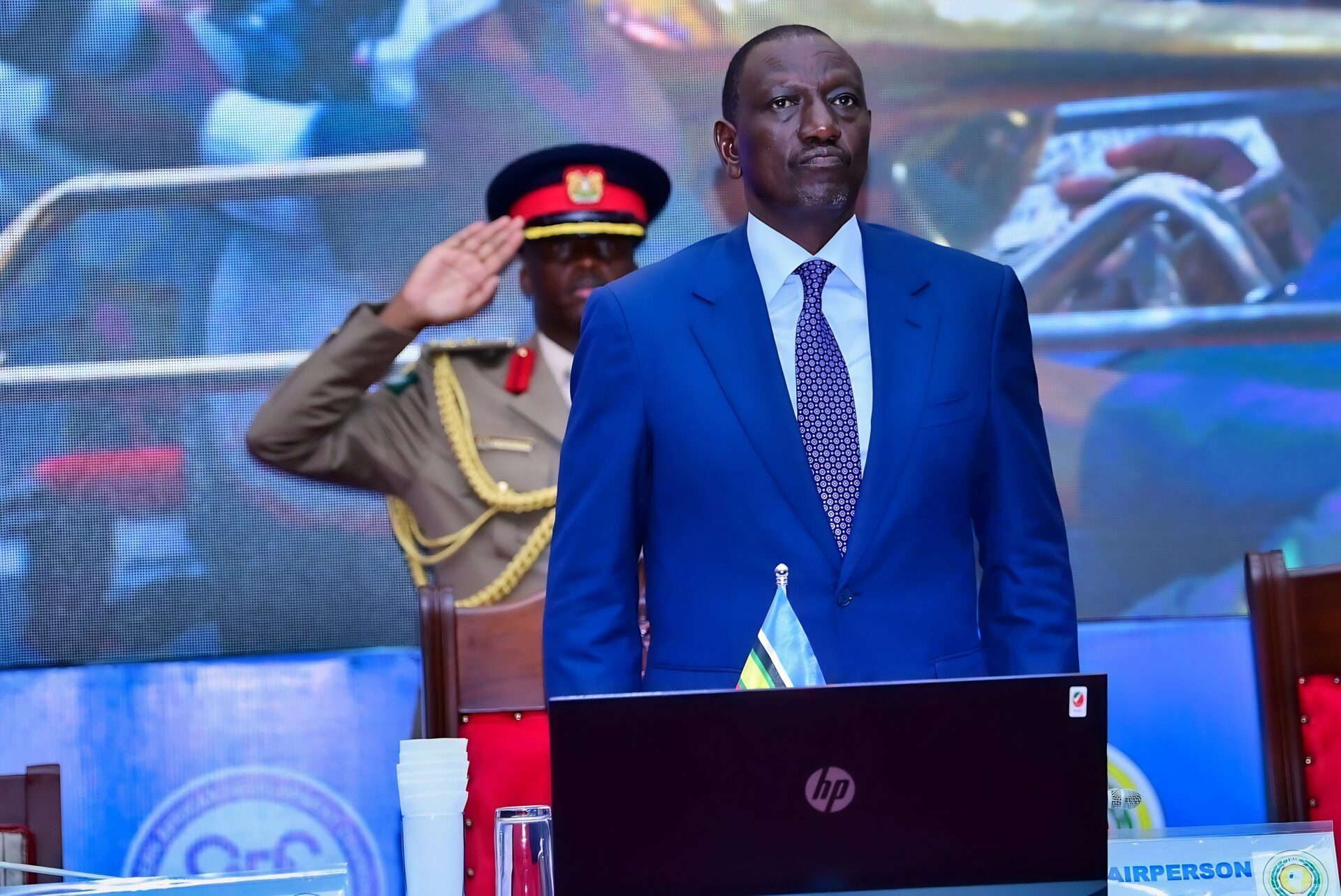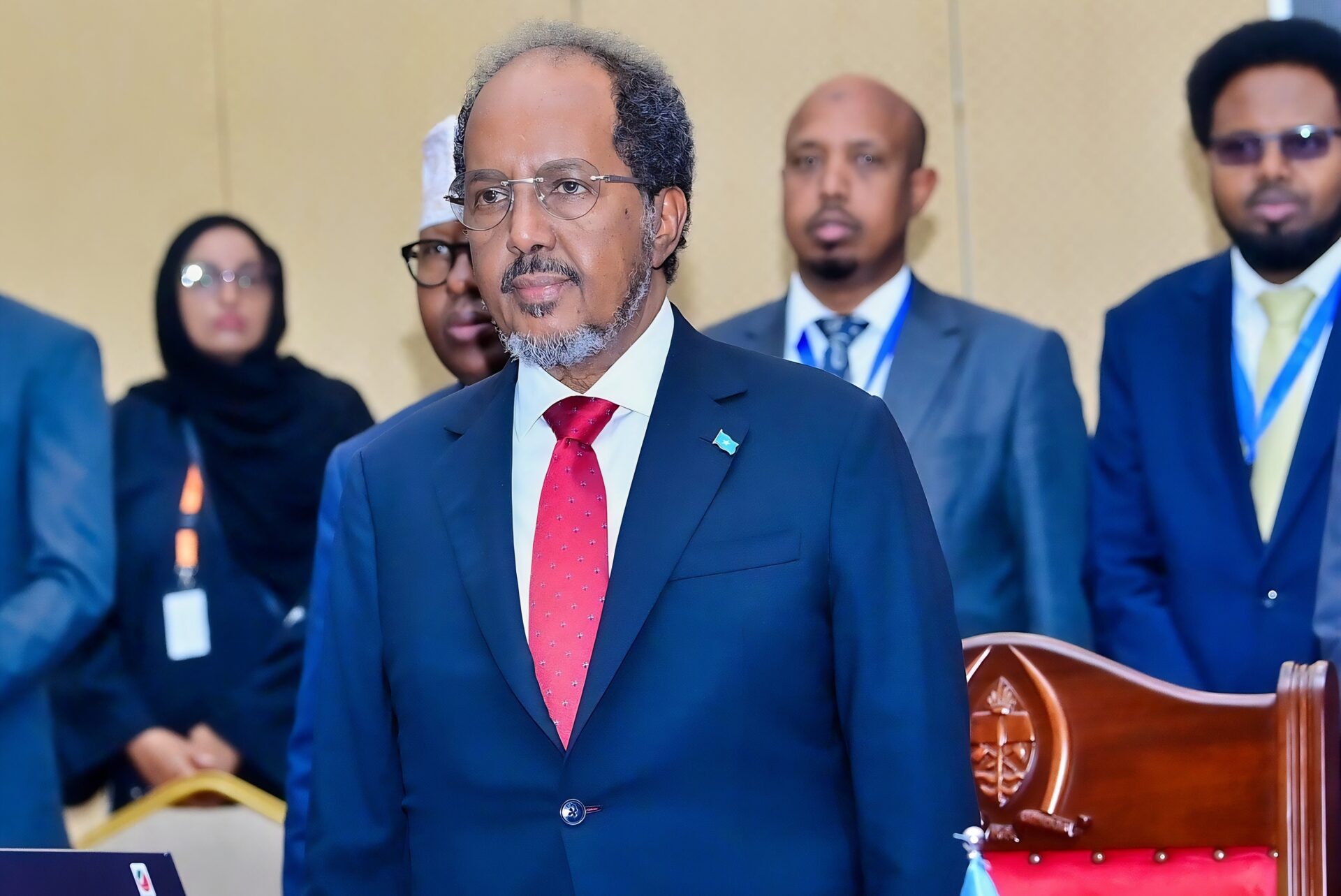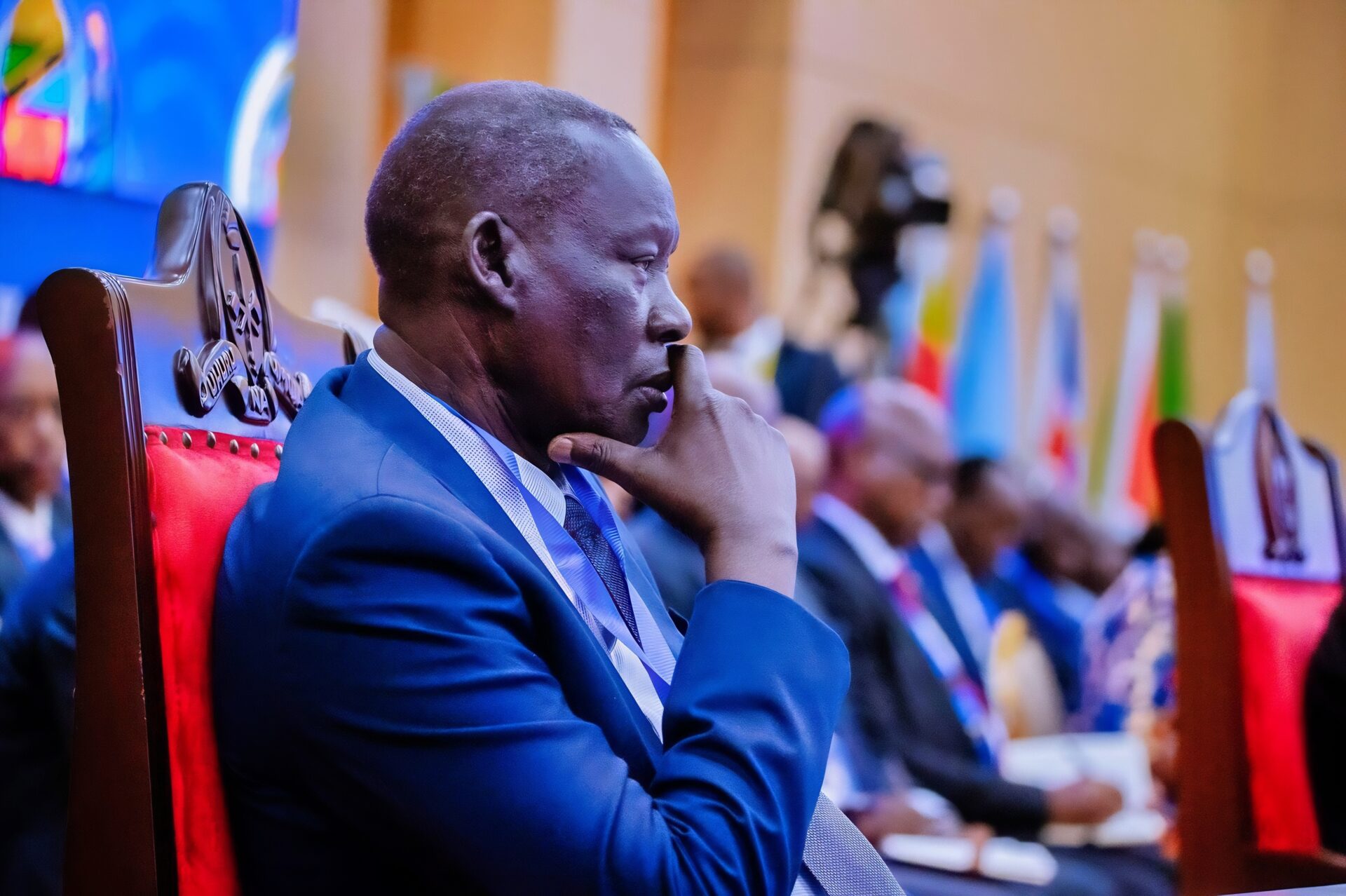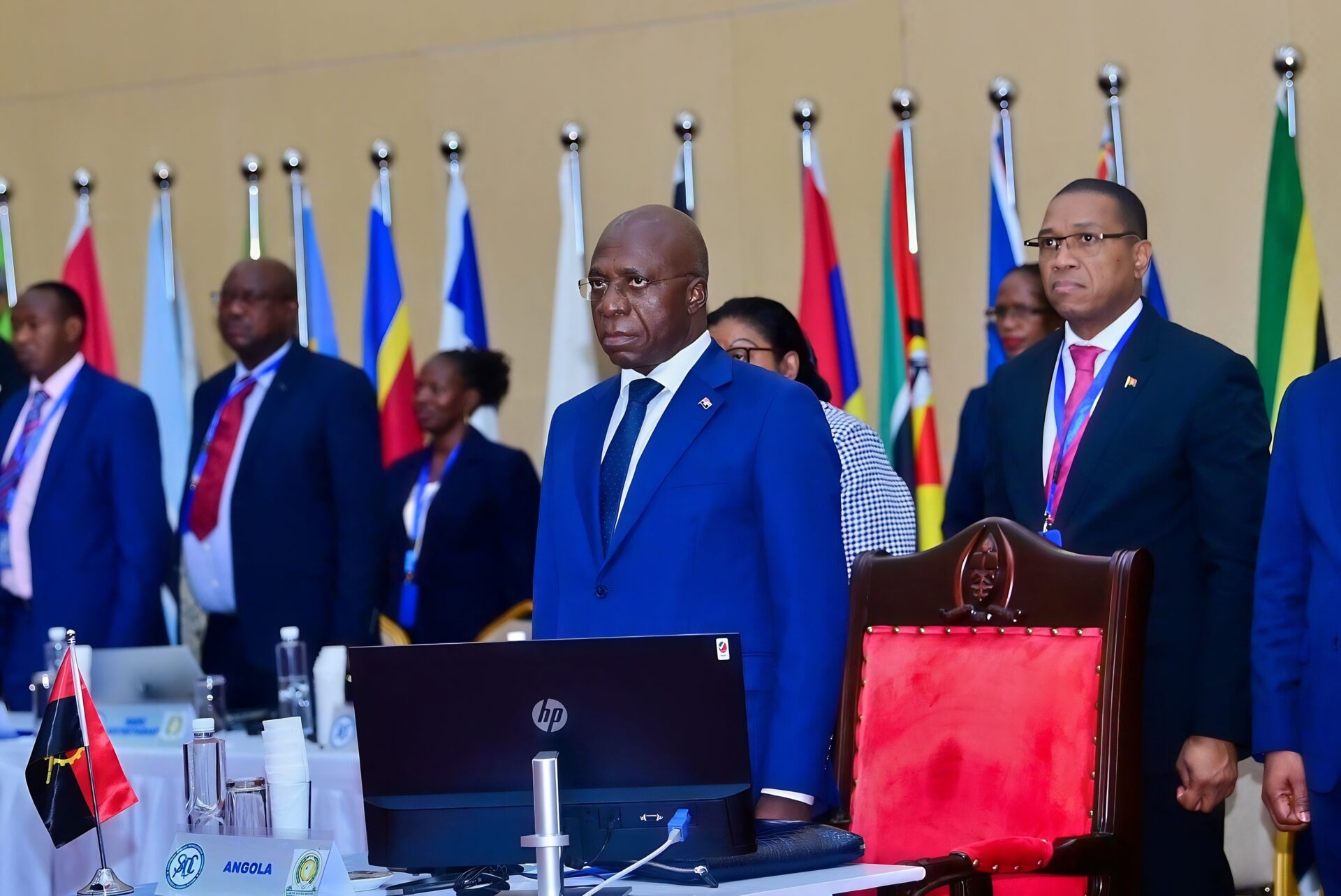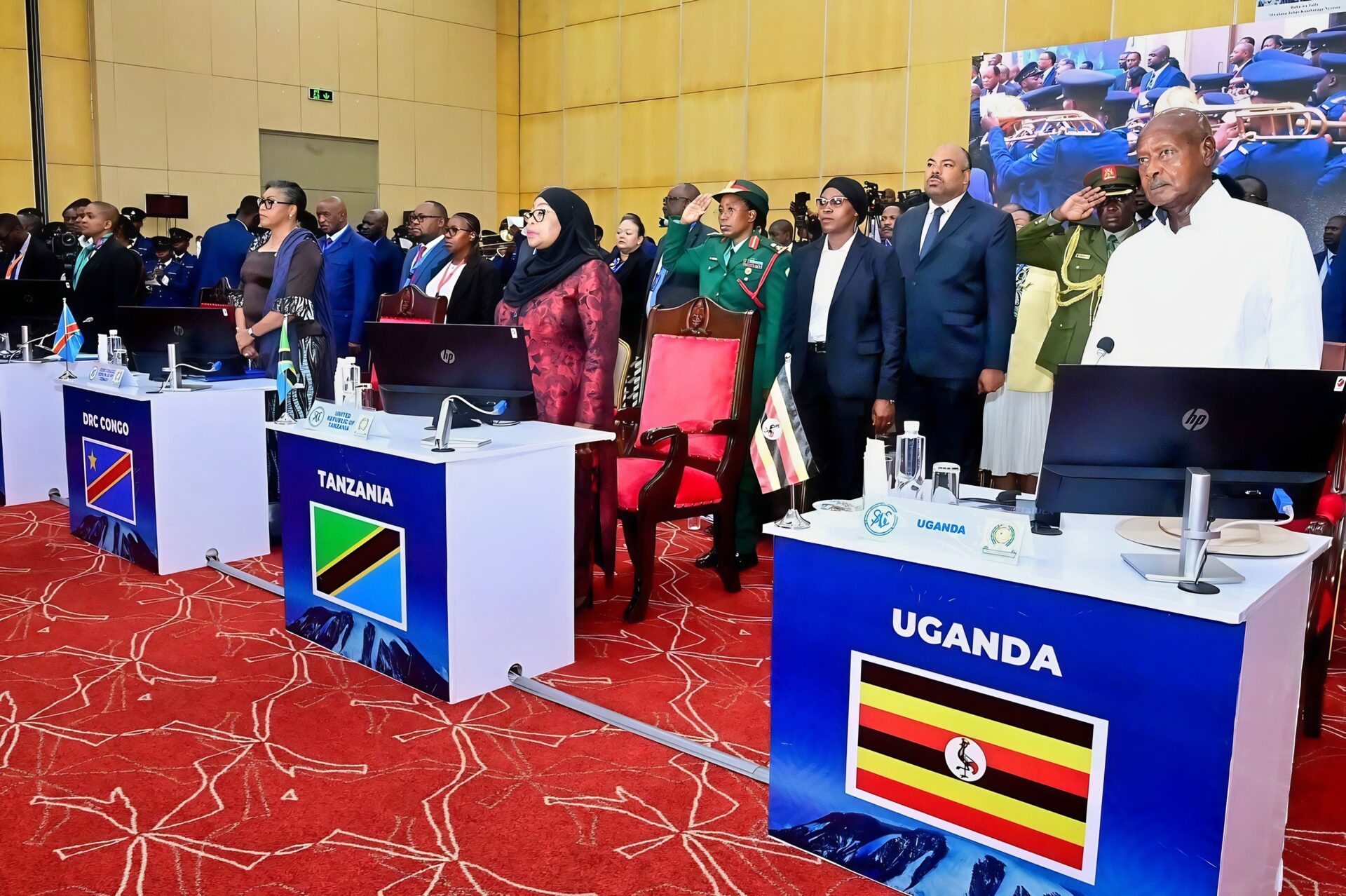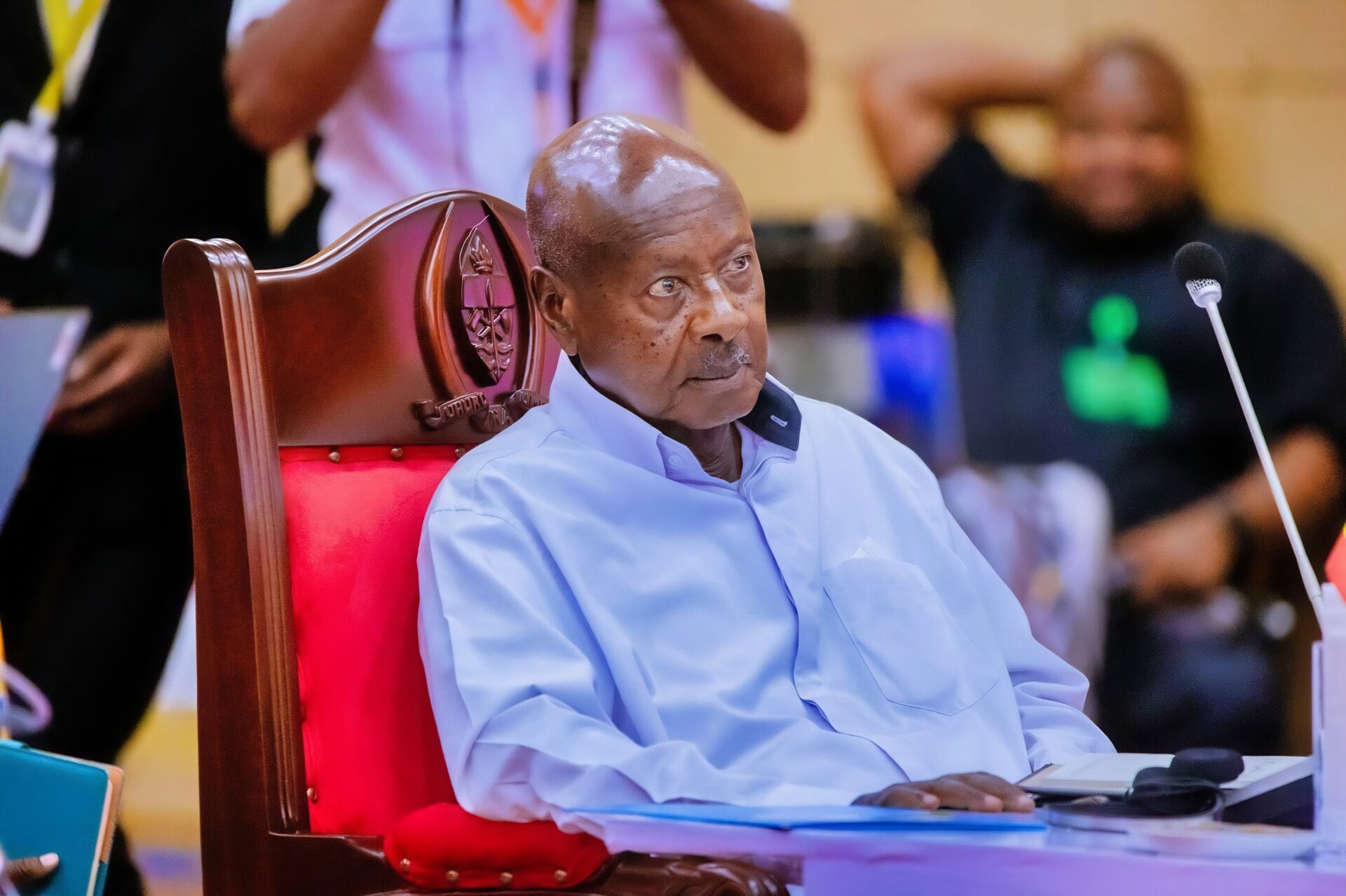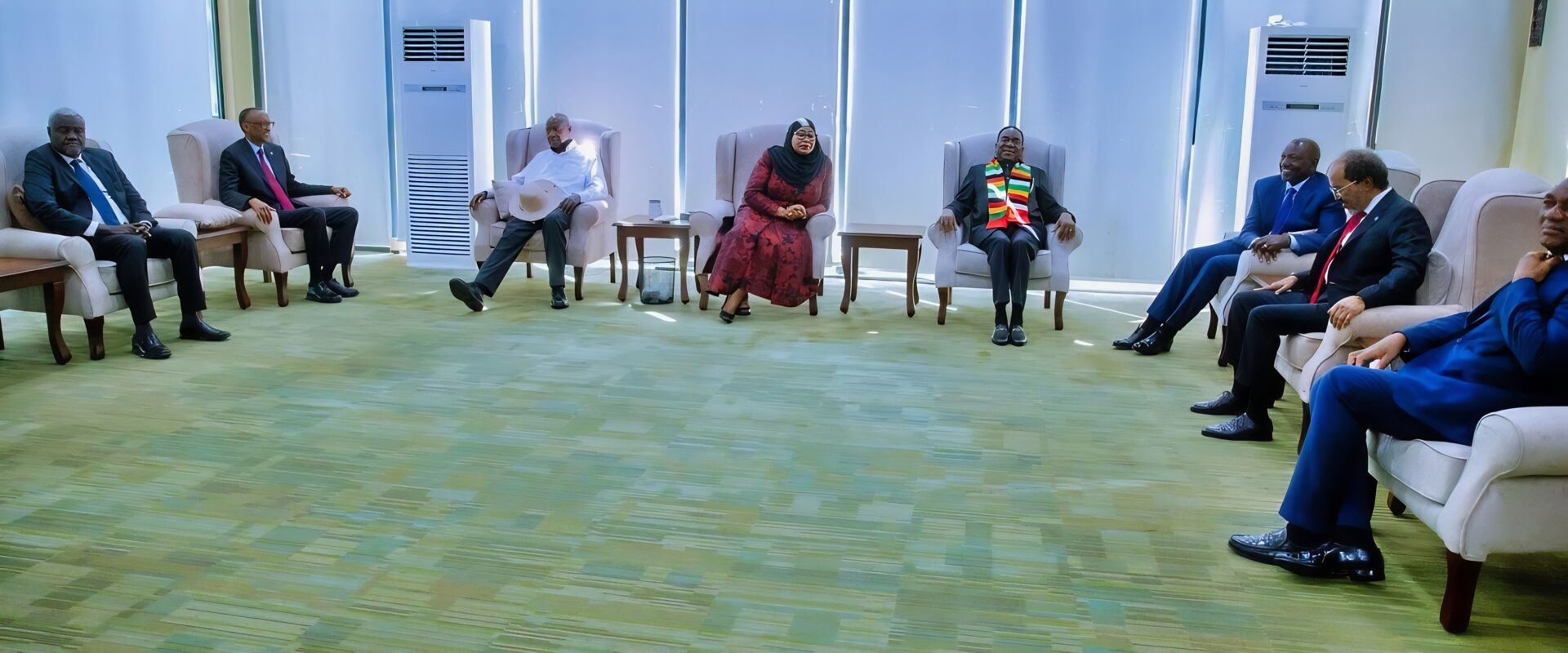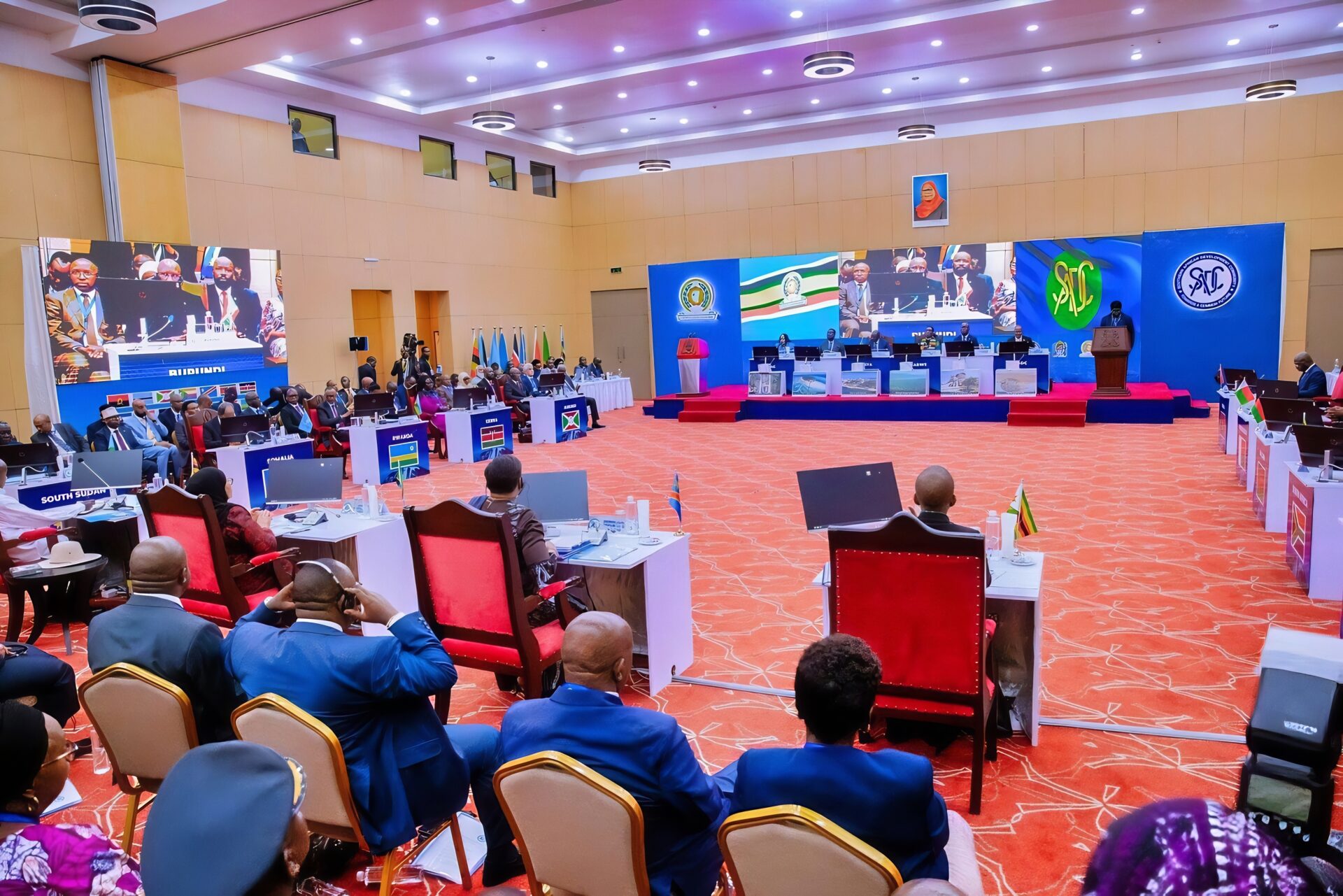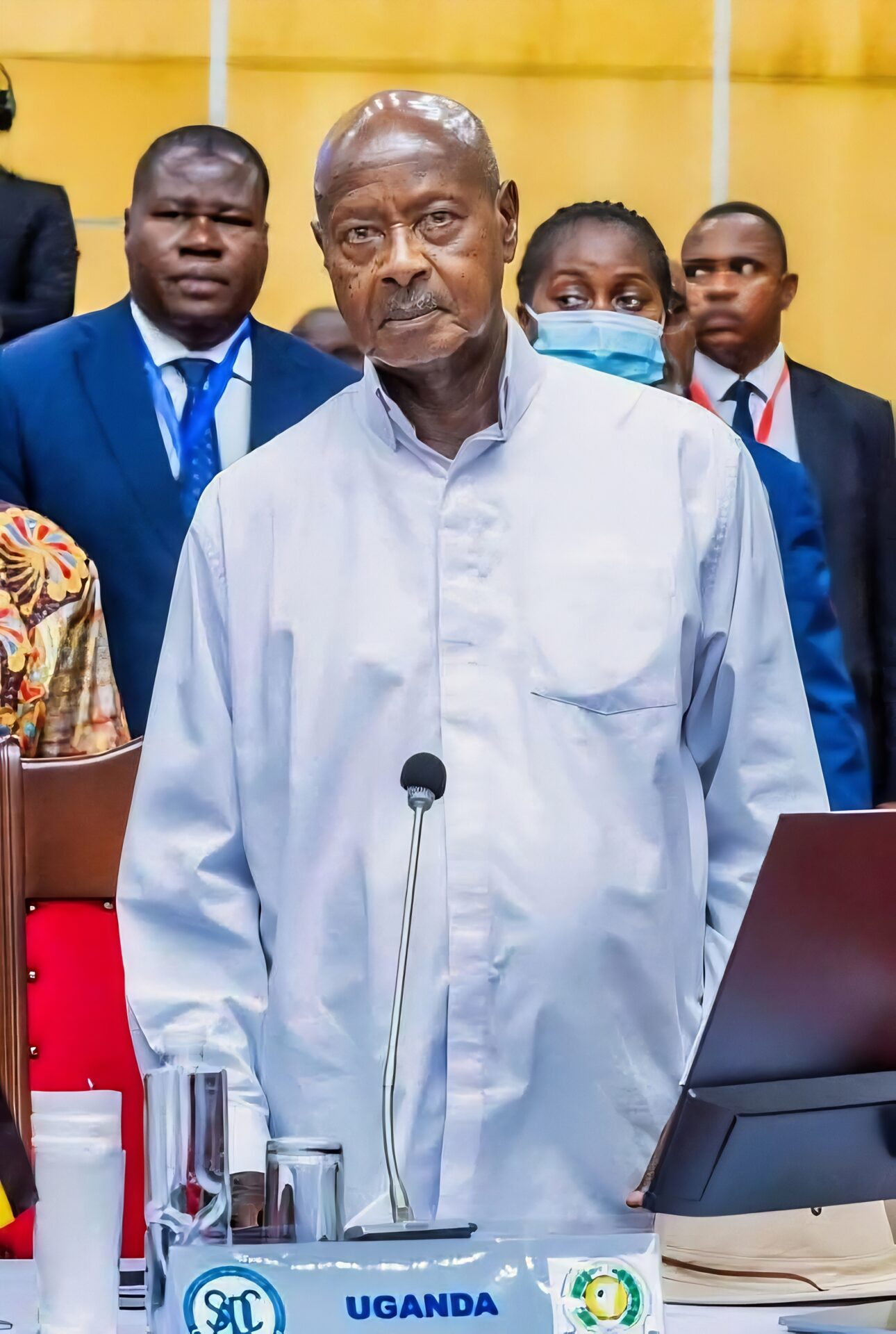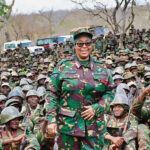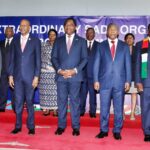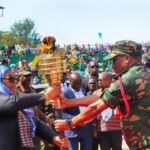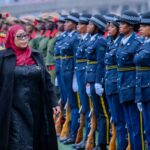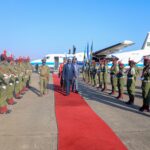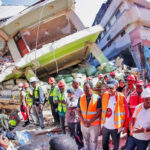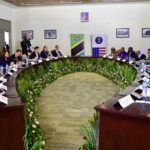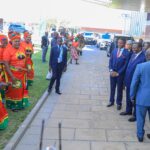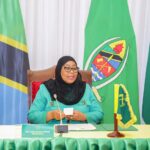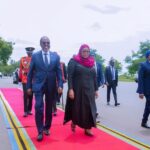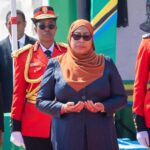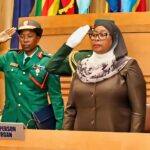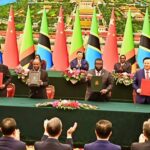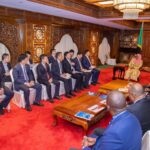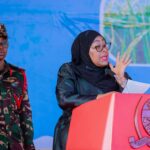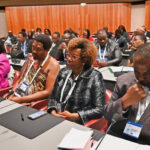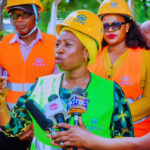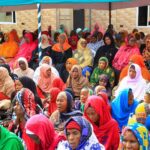Tanzania Pledges Continued Support for DRC Crisis Resolution
The President of the United Republic of Tanzania, Her Excellency Dr. Samia Suluhu Hassan, has provided reassurance to the Heads of State and Government of the East African Community (EAC) and the Southern African Development Community (SADC) that Tanzania will continue its efforts to address the ongoing crisis in the Democratic Republic of Congo (DRC).
Delivering her address at the Joint Meeting of Heads of State and Government of the EAC and SADC, held at the State House in Dar es Salaam, President Dr. Samia emphasised the urgent need for collaborative action to ensure the security and stability of the DRC, a member of both the EAC and SADC.
“The situation in the Eastern DRC is untenable and demands immediate intervention,” President Dr. Samia stated. “The ongoing crisis brings immense suffering to the people, and it is our collective responsibility to bring it to an end. I am confident that this meeting will result in decisions that will enable the people of the Eastern DRC to live in peace.”
The President of the Republic of Kenya, Hon. Dr. William Samoei Ruto, who also chairs the EAC, reinforced the importance of diplomatic efforts over military solutions. He further emphasised that the ongoing conflict in the Eastern DRC will not be resolved through the use of weapons. Instead, he emphasised the necessity of prioritising dialogue, active listening, and cooperative endeavours to ensure sustainable peace.
The President of the Republic of Zimbabwe and Chairman of SADC, Hon. Dr. Emmerson Dambudzo Mnangagwa, also delivered remarks, highlighting the broader implications of the DRC crisis on the African continent. “The ongoing situation in the Eastern DRC affects us all. African countries must unite, just as they did during the struggle for independence,” he urged.
The leaders reaffirmed their commitment to collaborate through the EAC and SADC frameworks to bring an end to the crisis in the DRC, fostering peace and stability in the region.
Unmasking Rwanda’s Role in the DRC Crisis: Kagame, M23 terrorists, and Western Complicity
The Democratic Republic of Congo (DRC) is a nation with abundant natural resources, yet it has been embroiled in protracted conflicts, resulting in widespread despair among its citizens. For many years, the eastern provinces of the DRC have been the primary theatre of conflict, displacement, and human suffering, compounded by external interference and internal divisions. In this context, the recent assurance by Her Excellency Dr. Samia Suluhu Hassan, President of Tanzania, to the East African Community (EAC) and the Southern African Development Community (SADC) underscores a renewed commitment to addressing this protracted crisis. In her address to the joint meeting of regional leaders in Dar es Salaam, President Samia emphasised the urgent need for collective action to secure peace in the DRC. The stability of the DRC is pivotal not only for the region, but for the entire African continent.
The gravity of this issue is underscored by the far-reaching ramifications of the DRC’s instability. It has been argued that the ongoing instability in the DRC has been a contributing factor to the humanitarian crises, cycles of violence and underdevelopment experienced across the African continent. In light of these challenges, the international community and human rights groups are called upon to assume active roles in the promotion of solutions, rather than merely observing from a distance. The call for dialogue, cooperation, and unity resonates profoundly in an era where global challenges demand collaborative responses. A thorough examination of the intricacies of the DRC crisis illuminates the necessity of confronting entrenched issues, including illegal invasions, resource plunder, chronic human rights abuses, and geopolitical manipulations, in order to achieve resolution. This article seeks to unpack these layers, shedding light on the root causes of the crisis while highlighting the critical role of regional and international actors in forging a path toward lasting peace.
The Strategic Calculus Behind Rwanda’s Actions
Rwanda’s involvement in the Democratic Republic of the Congo (DRC) is not merely an act of aggression; rather, it is a calculated strategy rooted in economic and geopolitical interests. The eastern provinces of the Democratic Republic of the Congo (DRC), notably North Kivu and South Kivu, are endowed with some of the world’s most abundant deposits of coltan, gold, tin, and tungsten. These minerals are pivotal to the global electronics industry. Rwanda’s support for the M23 and other proxy militias has enabled it to establish a foothold in these resource-rich regions, facilitating the exploitation and export of these minerals through its channels. This illicit trade has been shown to bolster Rwanda’s economy and strengthen its position as a regional power broker.
The United Nations Group of Experts has consistently documented Rwanda’s role in facilitating this exploitation. Reports indicate that Rwandan military officers have been directly involved in coordinating M23 operations, providing them with weapons, ammunition, and logistical support. In some cases, Rwandan troops have even crossed into Congolese territory under the guise of pursuing rebel groups like the Democratic Forces for the Liberation of Rwanda (FDLR), only to reinforce M23 terrorists positions instead. These actions are in violation of international law, including the UN Charter, which prohibits the use of force against the territorial integrity of another sovereign nation.
Humanitarian Fallout: A Trail of Devastation
The consequences of Rwanda’s intervention are manifest in the daily suffering of millions of Congolese civilians. The resurgence of the M23 terrorists in 2012 signalled a new wave of terror in the eastern DRC. Entire villages were razed to the ground, homes burned to the ground, and families torn apart. Sexual violence has been employed as a weapon of war, with women and girls subjected to egregious abuses at the hands of M23 terrorists. According to a report by the International Rescue Committee (IRC), the death toll since the onset of the conflict in 1998 exceeds 5.4 million, with many of these casualties occurring due to indirect causes such as disease, malnutrition, and displacement caused by violence.
One of the most egregious examples of M23’s brutality occurred in November 2022, when the group launched a series of attacks on civilian populations in Rutshuru Territory. In the village of Kishishe alone, for instance, more than 100 people were massacred, their bodies left strewn across fields and roadsides. Survivors have provided harrowing first-hand accounts of executions, looting, and arson. These atrocities have engendered a pervasive climate of fear, driving hundreds of thousands to seek refuge and flee their homes.
Denial and Deflection: Rwanda’s Propaganda Machine
Notwithstanding the preponderance of evidence indicating Rwanda’s complicity, the country has persistently refuted allegations of providing support to the M23 terrorists. Instead, it has utilised a sophisticated propaganda apparatus to deflect culpability onto the Congolese government. State-controlled media outlets portray Kinshasa as incapable of maintaining order, accusing it of harbouring genocidal forces such as the FDLR. While the existence of such groups cannot be disregarded, Rwanda’s narrative conveniently omits its own destabilising activities.
Kigali’s discourse frequently portrays its actions as a means of safeguarding Rwandan citizens and fostering regional stability. However, this justification is considered to be unconvincing in light of the extensive destruction caused by the M23 terrorists and other proxies. Critics contend that Rwanda’s true objective is to perpetuate a state of perpetual instability in the eastern DRC, thereby ensuring that no central authority can challenge its dominance over the region’s resources.
Regional and International Reactions
The international community has expressed strong disapproval of Rwanda’s actions, albeit with varying degrees of urgency. The African Union (AU) and the Southern African Development Community (SADC) have both called for restraint and dialogue, urging all parties to respect the sovereignty of the Democratic Republic of the Congo (DRC). In a similar vein, the United Nations Security Council has imposed sanctions on key M23 terrorists’ leaders and reiterated its demand for Rwanda to cease all forms of support for armed groups operating within Congolese borders.
However, the enforcement of these measures remains weak, partly due to divisions among major powers. Historically, Western countries, notably the United States and the United Kingdom, have shielded Rwanda from accountability, citing its post-genocide recovery and development achievements. This selective approach undermines efforts to hold Kigali accountable and perpetuates a culture of impunity.
Toward Accountability and Justice
In order to address the illegal incursion by Rwanda and its support for the M23 terrorists, a multifaceted response is required. Primarily, there is a necessity for greater transparency in mineral supply chains with a view to curbing the flow of conflict resources. Initiatives such as the Kimberley Process and Section 1502 of the U.S. Dodd-Frank Act signify a positive development in this regard; however, it is imperative that these initiatives are accompanied by more robust enforcement mechanisms to ensure their efficacy.
Secondly, regional organisations such as the EAC and SADC must adopt a more robust stance against aggressors. This should include the imposition of targeted sanctions on individuals and entities implicated in the funding or facilitation of armed groups. Furthermore, diplomatic pressure should be applied to ensure compliance with existing agreements, such as the Peace, Security, and Cooperation Framework for the DRC and the Region.
Finally, the international community must prioritise justice for victims of M23’s atrocities. The establishment of an independent tribunal or the enhancement of the capacity of the International Criminal Court (ICC) could facilitate the prosecution of perpetrators. The absence of such accountability, it is asserted, will perpetuate a cycle of violence, leaving the people of the DRC seemingly consigned to a perpetual state of distress.
A comprehensive examination of Rwanda’s illegal invasion and support for M23 terrorism underscores the necessity of addressing both the symptoms and the root causes of the DRC crisis. It is therefore the conclusion of this study that the restoration of peace and stability in the Democratic Republic of the Congo can only be achieved through concerted regional and international action.
The Human Toll: A Crisis of Unimaginable Suffering
The Democratic Republic of Congo (DRC) has a long history of conflict, but the resurgence of the M23 terrorists in late 2021 has resulted in a new wave of atrocities that have had a profound impact on the civilian population. According to Human Rights Watch and other humanitarian organisations, thousands of innocent Congolese have been killed since the M23’s renewed offensive began. Entire villages have been razed to the ground, homes reduced to ashes, and families torn apart. The magnitude of human suffering is profound, yet the international community has largely ignored this unfolding tragedy.
Massacres and Extrajudicial Killings
One of the most egregious examples of M23’s brutality occurred in November 2022, when fighters descended upon the village of Kishishe in North Kivu. Over 100 villagers were massacred in cold blood, their bodies left scattered across fields and roadsides. Survivors have provided first-hand accounts of scenes of unspeakable horror, including the execution of men in front of their families, the rape, and mutilation of women, and children being forced to witness the slaughter of their loved ones. This attack was not an isolated incident, but rather part of a broader pattern of violence targeting civilians in areas under the control or influence of the M23 terrorists.
The use of extrajudicial killings has become a hallmark of the conflict. Armed groups, allegedly supported by Rwanda, have been documented as perpetrating such executions, often targeting individuals suspected of collaborating with opposing factions or government forces. Often, victims are arbitrarily detained, subjected to torture, and then summarily executed without any semblance of due process. These actions, if proven, would constitute war crimes according to international law. However, the perpetrators of these crimes appear to be able to operate with near-total impunity, emboldened by the absence of any effective accountability mechanisms.
Sexual Violence as a Weapon of War
One of the most appalling consequences of the DRC conflict is the pervasive use of sexual violence against women and girls. The utilisation of rape as a weapon of terror has been observed, with instances of communities being subjected to humiliation, punishment, and displacement. M23 terrorists, in conjunction with other armed groups, have methodically targeted women and girls, subjecting them to heinous acts of sexual violence including gang rape, mutilation, and forced pregnancy.
A report by Médecins Sans Frontières (MSF) underscores the profound psychological and physical ramifications of these attacks. Many survivors suffer from severe trauma, chronic pain, and life-threatening infections. The social stigmatisation that accompanies sexual violence frequently results in victims being ostracized by their families and communities, exacerbating their suffering. Despite the efforts of local NGOs and international organisations to provide medical and psychosocial support, resources remain woefully inadequate to meet the overwhelming need.
Child Soldiers: The Lost Generation
Children represent a particularly vulnerable demographic within the scope of the DRC conflict. Numerous cases have been documented of children who have been orphaned, displaced, or coerced into serving with armed groups. M23 terrorists and other terrorist groups have been known to abduct boys as young as ten years old, forcing them to serve as combatants, porters, or spies. Furthermore, girls are frequently coerced into matrimony with combatants, subjected to repeated sexual abuse and exploitation.
The recruitment of child soldiers represents a violation of international humanitarian law and a profound infringement on the future prospects of an entire generation. A significant number of former child soldiers encounter difficulties in reintegrating into society, as they are often haunted by the horrors they have witnessed and participated in. While programmes aimed at rehabilitating and educating these children do exist, they are severely underfunded, resulting in a considerable number of young lives remaining in a state of limbo.
Impunity and the Failure of Justice
The most egregious aspect of the DRC crisis is arguably the pervasive culture of impunity that allows such atrocities to continue unchecked. Despite the existence of substantial evidence pertaining to war crimes and crimes against humanity, a paucity of perpetrators has been brought to justice. Weak judicial systems, pervasive corruption, and a conspicuous absence of political will have collectively engendered an environment in which accountability is virtually non-existent.
Measures undertaken to address this issue have been inconsistent and largely ineffectual. While the International Criminal Court (ICC) has issued arrest warrants for some high-profile figures, such as Bosco Ntaganda – a former M23 terrorists commander convicted of war crimes – the majority of those responsible for atrocities remain at liberty. In the context of these challenges, regional bodies such as the African Union (AU) and the East African Community (EAC) have issued calls for investigations and prosecutions. However, the effectiveness of these measures in addressing the issue remains limited.
The Role of External Actors
It is evident that Rwanda’s alleged support for the M23 terrorists has had a significant impact on the ongoing human rights crisis in the Democratic Republic of the Congo (DRC). Through the provision of arms and financial resources to the militia, the Rwandan government, under President Paul Kagame, has indirectly contributed to the commission of atrocities against the civilian population of the Democratic Republic of the Congo. This complicity underscores the urgent need for greater scrutiny of external actors involved in the conflict. Historically, Western governments have shielded Rwanda from accountability, but the present situation demands a re-evaluation of these policies, with the protection of human rights given priority over geopolitical interests.
Toward Robust Protection Mechanisms
The resolution of the ongoing human rights violations in the Democratic Republic of the Congo necessitates both prompt and sustained action. Primarily, there is a necessity for a concerted effort to strengthen accountability mechanisms. This necessitates the facilitation of independent investigations into war crimes, the expansion of the ICC’s mandate, and the assurance of consequences for perpetrators of human rights violations.
Secondly, there is a need to implement robust protection measures to safeguard vulnerable populations. Peacekeeping missions, such as the United Nations Organization Stabilization Mission in the Democratic Republic of the Congo (MONUSCO), play a critical role in protecting civilians. Nevertheless, these missions have been hindered by constrained resources and circumscribed mandates. The enhancement of funding and operational capacity could serve to augment the ability of such missions to prevent atrocities and respond to crises.
Finally, it is imperative that regional and international actors prioritise the provision of humanitarian assistance to survivors of violence. This should include the provision of medical and psychosocial services, the provision of legal aid to victims of sexual violence, and the creation of safe spaces for displaced persons. It is only through the provision of comprehensive support that the psychological and physical wounds inflicted by armed conflict can be addressed and healing can begin.
A Call to Action: Breaking the Silence and Building a Path Forward
The Democratic Republic of Congo (DRC) finds itself at a critical juncture in its history. The Congolese people have suffered extensively over the course of several decades, enduring massacres, sexual violence, forced displacement, and systemic exploitation. The international community has largely failed to respond adequately to these ongoing atrocities. However, the principle of silence being tantamount to complicity must be acknowledged. The killings of innocent Congolese and the chronic human rights abuses perpetrated by armed groups are not just regional issues; they are global moral failures. It is incumbent upon members of the international community, human rights advocates, and global citizens to take action. The time for deliberation has passed; the question now is not whether we can act, but how we will act.
Amplifying Voices Through Awareness
One of the most potent instruments at our disposal is awareness. For an extended period, the narratives of those affected by the Congolese conflict have been marginalised or disregarded. In order to amplify their voices, it is essential to utilise every available platform, including media outlets, social networks, academic institutions, and advocacy organisations, to illuminate their situation. Documentaries, investigative journalism and survivor testimonies have the potential to act as catalysts for change, forcing the world to confront the harsh realities faced by millions in the DRC.
A pertinent example of this phenomenon is the #BringBackOurGirls campaign, which brought global attention to the abduction of schoolgirls by Boko Haram in Nigeria. A similar approach could be adopted to draw attention to the atrocities occurring in the DRC. Social media platforms, in particular, offer an unparalleled opportunity to mobilise public opinion and pressure policymakers into action. The mobilisation of these voices, through the sharing of personal narratives, the organisation of virtual events, and the engagement of influential figures, is instrumental in amplifying the voices of Congolese civilians and ensuring their concerns are given due consideration.
Holding Perpetrators Accountable
Justice cannot wait. The culture of impunity that has allowed war crimes and crimes against humanity to flourish in the DRC must end. This requires a multi-pronged approach:
- Strengthening International Legal Mechanisms : The International Criminal Court (ICC) should expand its investigations into crimes committed in the DRC, with a focus on holding both local and external actors accountable. Rwanda’s alleged support for M23 terrorists and other terrorist groups should be thoroughly examined, and evidence of complicity must lead to consequences.
- Regional Accountability Initiatives : In the context of international relations, bodies such as the African Union (AU) and the Southern African Development Community (SADC) have a responsibility to adopt a more robust stance in the face of aggression. A range of targeted measures, including sanctions, travel restrictions and asset freezes, should be considered against individuals and entities believed to be providing financial support or operational facilitation to terrorist groups.
- Corporate Responsibility : In order to address the issue of conflict minerals, companies that profit from them must be held accountable. This can be achieved by strengthening regulations such as Section 1502 of the U.S. Dodd-Frank Act and the European Union Conflict Minerals Regulation, which can help curb the flow of illicit resources fuelling the conflict. Transparency initiatives, such as the Extractive Industries Transparency Initiative (EITI), should be expanded to include stricter oversight of supply chains.
Supporting Survivors and Rebuilding Communities
In addition to the imperative of accountability, the needs of survivors must be accorded primacy. Humanitarian assistance must extend beyond the provision of emergency aid to address the underlying causes of vulnerability. Programmes with a focus on education, healthcare, and livelihood restoration have the potential to empower displaced populations and foster resilience. Special attention should be given to women and children, who are disproportionately affected by the conflict.
Notable examples of organisations addressing this issue include Women for Women International and Heal Africa, which have been instrumental in providing trauma counselling, vocational training, and medical care to survivors of sexual violence. It is recommended that funding for such initiatives be increased, with a view to making a tangible difference in the lives of countless individuals. Furthermore, there is a need to expand rehabilitation programmes for former child soldiers with a view to reintegrating them into society and breaking the cycle of violence.
Engaging Global Citizens
Every individual has a role to play in advocating for peace and justice in the DRC. Here are some concrete steps you can take:
- Educate Yourself and Others : Please familiarise yourself with the history and dynamics of the DRC conflict. Share articles, documentaries, and reports with your network in order to raise awareness.
- Support Ethical Consumption : It is recommended that you avoid purchasing electronics that contain conflict minerals. Instead, you should search for products that are certified as “conflict-free” and advocate for greater transparency in corporate supply chains.
- Advocate for Policy Change : It is imperative that citizens write to their elected representatives, urging them to prioritise human rights in foreign policy decisions related to the DRC. Furthermore, it is crucial to support legislation aimed at curbing illegal resource extraction and holding perpetrators accountable.
- Donate to Trusted Organizations : Contributions are encouraged to NGOs operating in the field in the Democratic Republic of the Congo (DRC), including the International Rescue Committee (IRC), Médecins Sans Frontières (MSF), and MONUSCO’s humanitarian partners.
Ensuring the World Remembers
History has demonstrated that the process of forgetting can result in the repetition of past mistakes. In order to ensure that the plight of the Congolese people is not consigned to oblivion, it is essential to establish a system of remembrance. The establishment of annual observances, memorials, and educational curricula is recommended in order to maintain the visibility of the issue in the public consciousness. Collaborations between artists, writers, and activists can create cultural artefacts that honour the resilience of the Congolese people and demand accountability for past injustices.
A Collective Resolve
The answers to these questions are not to be found in idealistic principles, but rather in practical, achievable commitments. Compassion in the absence of action is rendered hollow; conviction in the absence of courage is rendered meaningless. The citizens of the Democratic Republic of the Congo (DRC) are entitled to more than mere sympathy; they are entitled to justice, dignity, and hope. As global citizens, we possess the capacity to effect change. The question that must be posed is whether this potential will be realised.
The question must be posed: What kind of legacy do I want to leave behind? The choice is not one between apathy and action, but rather between acquiescence and participation in the demand for peace and accountability. The onus is on each individual to decide which course of action to take, and the present moment is the optimal time to take action.
The Plunder of Congolese Natural Resources: A Recipe for Conflict and Exploitation
The Democratic Republic of Congo (DRC) is frequently characterised as the world’s most abundant country in terms of natural resources. It is estimated that beneath its soil lie mineral reserves with an estimated value of $24 trillion that remain untapped, including coltan, gold, diamonds, cobalt, copper, and tin. These resources are considered indispensable to modern technology and global industries. However, it is a matter of paradox that this immense wealth has not translated into prosperity for the Congolese people. Instead, it has become a curse, with negative consequences including corruption, conflict, and poverty, whilst enriching foreign actors and armed groups at the expense of local communities.
The Lure of Coltan and Other Strategic Minerals
Coltan, abbreviated from columbite-tantalite, serves as a quintessential illustration of the systematic exploitation of the Democratic Republic of the Congo’s natural resources. This rare mineral is a critical component in the production of electronic devices such as smartphones, laptops, and electric vehicles. The Democratic Republic of the Congo (DRC) is responsible for the production of over 60% of the world’s coltan, yet the vast majority of profits generated from its exploitation bypass the Congolese economy entirely (UNDP, 2022). Instead, these resources are smuggled out of the country through illicit trade networks, often with the complicity of neighbouring states such as Rwanda.
Rwanda plays a central role in this scheme. Despite having negligible coltan deposits of its own, Rwanda exports vast quantities of the mineral annually, much of which originates from eastern DRC. According to reports by the United Nations Group of Experts, Rwandan military officers and political elites profit handsomely from this illegal trade. By facilitating the transportation of stolen resources through its territory, Rwanda effectively facilitates the laundering of Congolese minerals before their subsequent export to global markets under the guise of legitimate commercial activities.
This dynamic extends beyond coltan. A similar pattern is observed in gold, another highly sought-after resource. Armed groups and corrupt officials have been implicated in the smuggling of gold out of the DRC, where it is then refined and sold internationally without any trace of its origins. These illicit proceeds then fund further violence, perpetuating a vicious cycle of exploitation and instability.
The Human Cost of Resource Plunder
The extraction of Congolese natural resources has been shown to have a profoundly detrimental effect on local communities. Mining operations, whether licit or illicit, are frequently conducted in isolated regions with inadequate regulation and oversight. Those engaged in such endeavours, including children, are subjected to hazardous conditions in exchange for wages that are often meagre or non-existent. Furthermore, the displacement of entire communities to make way for mining activities has been observed, with families being rendered homeless and deprived of access to fundamental services such as healthcare and education.
The competition for control over mineral-rich territories has been a significant driver of violent conflict. terrorist groups, including the M23 and the Allied Democratic Forces (ADF), compete for dominance in these zones, employing brutal tactics to subjugate local populations and eliminate rivals. Those civilians caught in the crossfire are subject to massacres, sexual violence, and forced recruitment into militias. The analysis thus posits that the very resources that could potentially uplift the Congolese people have, in effect, become instruments of their oppression.
Global Complicity in the Exploitation
The exploitation of Congolese resources is not confined to regional actors; it extends to global corporations and consumers who benefit indirectly from this illicit trade. Many electronics manufacturers rely on supply chains tainted by conflict minerals, either knowingly or unknowingly. While initiatives such as the Dodd-Frank Act’s Section 1502 and the European Union Conflict Minerals Regulation aim to increase transparency, enforcement remains inconsistent. Consequently, companies persist in sourcing minerals from questionable sources, thus perpetuating the cycle of exploitation.
Furthermore, Western governments must accept their share of responsibility in enabling this system. Bilateral aid packages and diplomatic cover provided to Rwanda and other regional actors shield them from accountability for their roles in facilitating resource plunder. This incongruity between rhetoric and action undermines efforts to promote ethical business practices and sustainable development in the DRC.
Addressing the Root Causes
In order to bring an end to the cycle of plunder and exploitation, concerted action is required at several levels:
- Strengthening International Sanctions
It is imperative that governments enforce international sanctions against conflict minerals with greater rigour. In order to achieve this, regional bodies such as the East African Community (EAC) and the Southern African Development Community (SADC) must collaborate to monitor cross-border trade and identify smuggling routes. - Enhancing Supply Chain Transparency
It is incumbent upon companies to assume greater responsibility for ensuring that their supply chains are free of conflict minerals. Certification programmes such as the Kimberley Process for diamonds should be expanded to include other minerals. Independent audits and third-party verification can help ensure compliance. Consumers also have a role to play by demanding ethically sourced products and supporting brands committed to transparency. - Empowering Local Communities
It is vital that revenue generated from the Democratic Republic of the Congo’s natural resources is reinvested in local communities. Transparent governance mechanisms, supported by international partners, can help ensure that mining revenues fund infrastructure, education, and healthcare rather than being misappropriated by corrupt officials. Community-based cooperatives can empower miners to negotiate fair wages and working conditions. - Supporting Legal Frameworks
It is imperative that efforts are made to strengthen the legal frameworks of the Democratic Republic of the Congo (DRC) in order to combat the issue of resource plunder. Such efforts may take the form of anti-corruption measures, judicial reforms, and capacity-building initiatives. The implementation of these measures would enhance the government’s ability to regulate mining activities and to prosecute offenders. International organisations such as the World Bank and the United Nations may provide technical assistance to support these efforts. - Promoting Regional Cooperation
In the context of the transnational nature of resource plunder, regional cooperation is imperative for effective mitigation strategies. The roles of countries such as Rwanda, Uganda, and Burundi in facilitating the illegal trade of Congolese minerals must be thoroughly examined and addressed. The establishment of joint task forces and the implementation of information-sharing agreements have been identified as key mechanisms to dismantle smuggling networks and disrupt the flow of illicit resources.
Toward a Sustainable Future
The exploitation of Congolese natural resources constitutes a significant injustice in the contemporary era. This issue serves as a poignant reminder that wealth alone is not a guarantee of prosperity; equitable distribution and responsible stewardship of natural resources are equally crucial. To this end, it is incumbent upon the international community to prioritize transparency, accountability, and sustainability in the management of the DRC’s resources, if the country is to realise its potential.
As global citizens, introspection is imperative: Are we willing to ignore the suffering caused by our consumption habits? Or will we demand change, holding corporations and governments accountable for their complicity in this exploitation? The answers to these questions are found in our collective resolve to act with integrity and purpose.
The people of the DRC are entitled to a future in which their natural wealth is utilised for their benefit, rather than that of warlords, foreign actors, or multinational corporations. It is only through concerted action that a route towards justice, peace and shared prosperity can be forged. The question is therefore whether the reader would be willing to join the movement.
The Humanitarian Fallout: Mass Displacement and Its Devastating Consequences
The Democratic Republic of Congo (DRC) is home to one of the world’s largest internally displaced populations, with over 6 million people forcibly displaced from their homes due to conflict, violence, and insecurity. This staggering figure, reported by the Internal Displacement Monitoring Centre (IDMC), underscores the catastrophic humanitarian fallout of the ongoing crisis. For millions of Congolese civilians, displacement has become a grim reality, characterised by a state of limbo, marked by deprivation, vulnerability, and despair.
A Life in Squalor: The Harsh Realities of Displacement
Displaced families frequently find themselves residing in improvised encampments or unplanned urban settlements, where conditions are often extremely challenging. A significant proportion of these individuals lack access to necessities such as food, clean water, healthcare, and education. In rural areas, overcrowded camps place additional strain on limited resources, leaving residents vulnerable to disease outbreaks, malnutrition, and extreme poverty. Those seeking refuge in urban areas encounter further challenges in terms of integration into communities facing similar economic hardship.
The consequences of these circumstances are especially pronounced for children. The denial of access to education for this generation risks the perpetuation of cycles of poverty and marginalisation. The issue of malnutrition is of particular concern, with a significant proportion of displaced children exhibiting signs of stunted growth and immune system weakness. The psychological impact of displacement, characterised by instability and a lack of safety, further exacerbates the already considerable physical challenges faced by these children.
Women and Girls: Vulnerable Targets
The present study seeks to explore the ways in which women and girls are affected by the displacement crisis. Within overcrowded camps and unplanned urban settlements, they encounter elevated risks of sexual exploitation, gender-based violence, and human trafficking. terrorist groups have been known to target these populations, using rape as a weapon of war to instil fear and exert control. The psychological impact of such experiences is profound, often resulting in lifelong trauma and stigmatisation within their respective communities.
Furthermore, women in displacement settings are frequently compelled to assume the primary responsibility for caring for their families, yet they are seldom provided with adequate support. Furthermore, pregnant women face increased risks of complications during childbirth due to their limited access to reproductive health services and maternal care. The absence of designated safe spaces and effective protection mechanisms leaves them vulnerable to further harm, perpetuating a cycle of suffering that appears to be interminable.
Boys at Risk: Recruitment by Armed Groups
It is evident that the phenomenon of displacement can have a detrimental effect on individuals of all ages, including boys. It has been documented that many are targeted for recruitment by armed groups, who lure them in with promises of food, shelter, or a sense of belonging. Once conscripted, these boys find themselves thrust into a life of violence, compelled to participate in atrocities that haunt them long after they escape. Those who manage to disengage from such groups often encounter difficulties in reintegrating into society, and are frequently rejected by their communities.
Efforts to rehabilitate former child soldiers are extant, but remain underfunded and insufficient to meet the overwhelming need. Programmes providing psychosocial support, vocational training and education are critical to helping these individuals reclaim their futures. Nevertheless, without the requisite investment and political commitment, these initiatives risk falling short of their potential.
The Psychological Toll of Displacement
Beyond the physical hardships, the psychological toll of displacement cannot be overstated. For those who have experienced violence, displacement engenders an additional layer of trauma. Families torn apart by conflict must navigate the loss of loved ones while grappling with uncertainty about their future. The constant threat of renewed violence forces many to live in perpetual fear, unable to plan or dream beyond the immediate present.
Children growing up in displacement settings often exhibit signs of acute stress, anxiety, and depression. The absence of access to mental health services further entrenches these cycles of trauma. The absence of secure environments conducive to play, learning, and social interaction further exacerbates the situation, as it deprives young minds of the opportunity to heal and develop resilience.
Refugee Camps: Overwhelmed and Underfunded
Refugee camps situated along the borders with Uganda, Burundi, and Tanzania function as critical lifelines for thousands of Congolese individuals seeking refuge from the ongoing violence. However, these camps are manifestly inadequate in meeting the needs of their rapidly expanding populations. The overcrowding, inadequate sanitation, and insufficient funding have created conditions conducive to the outbreak of disease and further suffering. Humanitarian organisations operating in these contexts encounter significant challenges in delivering aid, due to limited resources and restricted access to conflict-affected regions.
In Uganda, the largest host country, settlements such as Bidi Bidi and Nakivale have reached capacity, forcing new arrivals to live in even more precarious conditions. A similar scenario is unfolding in Burundi and Tanzania, where local communities are struggling to accommodate the influx of displaced people. The strain on local infrastructure, including schools, hospitals and water systems, is palpable, exacerbating tensions between refugees and host populations.
Toward Durable Solutions
Addressing the mass displacement of Congolese civilians requires a multifaceted approach that prioritizes both immediate relief and long-term solutions:
- Expanding Humanitarian Aid
It is imperative that increased funding is allocated to support humanitarian organisations operating in the Democratic Republic of the Congo (DRC) and neighbouring countries. Donor countries must increase their financial contributions to ensure that displaced populations receive adequate food, shelter, healthcare, and education. Special attention must be given to protecting women and children, who are disproportionately affected by displacement. - Promoting Peace and Stability
The provision of sustainable solutions to displacement is contingent upon the resolution of the root causes of conflict. Regional bodies such as the East African Community (EAC) and the Southern African Development Community (SADC) are obliged to collaborate in order to address the drivers of violence, including illegal resource extraction and external interference. Diplomatic efforts should be concentrated on the fostering of dialogue and reconciliation among conflicting parties. - Supporting Local Integration
For those unable to return home, local integration offers a viable pathway to rebuilding lives. Host governments, with support from international partners, can implement policies that facilitate access to employment, education, and healthcare for displaced populations. Community-based programs can help foster social cohesion between refugees and host communities. - Strengthening Mental Health Services
It is imperative that mental health be accorded a position of paramount importance within the domain of humanitarian response. The deployment of mobile clinics, the provision of counselling services, and the establishment of peer support groups have the potential to deliver essential care to survivors of violence and displacement. The training of local health workers to address psychological trauma has the capacity to enhance the sustainability of these interventions. - Empowering Youth and Women
Investing in education and skills development for displaced youth is imperative in order to break cycles of poverty and violence. Vocational training programmes have been shown to equip young people with the tools they need to build brighter futures. Similarly, the empowerment of women through microfinance initiatives, leadership training, and legal advocacy has been demonstrated to help them regain agency and resilience.
A Call to Action
The mass displacement of Congolese civilians represents not merely a humanitarian crisis, but a moral imperative. As members of the global community, it is imperative that we take action to address the plight of millions facing dire conditions, devoid of dignity and hope. It is incumbent upon the international community to act with alacrity to alleviate suffering, protect vulnerable populations, and establish pathways towards sustainable solutions.
What measures will be implemented to amplify the voices of displaced Congolese individuals? Furthermore, what measures can be implemented to ensure that the plight of these individuals does not become consigned to oblivion? The answers to these questions are found in our collective commitment to prioritise humanity over indifference, compassion over apathy. Only through concerted action can we ensure a future in which no individual is left behind.
Rwanda’s Media Propaganda and Paul Kagame’s Arrogance: A Narrative of Deception and Defiance
Rwanda’s involvement in the Democratic Republic of Congo (DRC) crisis is characterised not only by its military and economic interventions, but also by a sophisticated propaganda apparatus that seeks to justify its actions. Under the leadership of Criminal Paul Kagame, Rwanda has crafted a narrative designed to deflect blame, manipulate public perception, and legitimize its destabilizing activities in the eastern DRC. This strategy of misinformation, in combination with Kagame’s authoritarian leadership style, underscores a broader pattern of arrogance and impunity that undermines regional stability and international norms.
Crafting a False Narrative: The Role of State-Controlled Media
At the core of Rwanda’s propaganda efforts is its state-controlled media apparatus, which serves as a tool for shaping both domestic and international narratives about the DRC conflict. Rwandan outlets have a consistent pattern of portraying the Congolese government as incompetent, corrupt, and incapable of ensuring security within its borders. The Rwandan government asserts that its interventions are essential for safeguarding regional stability and thwarting the resurgence of genocidal forces, such as the Democratic Forces for the Liberation of Rwanda (FDLR).
However, this narrative fails to acknowledge Rwanda’s own role in exacerbating the crisis. By framing its actions as defensive measures rather than aggressive incursions, Kigali seeks to position itself as a victim rather than an aggressor. For instance, when evidence emerged connecting Rwanda to the arming and financing of M23 rebels, Rwandan officials dismissed these claims as “fabrications” aimed at tarnishing the country’s reputation. This discourse finds resonance with certain international observers who perceive Kagame as a reformist leader committed to post-genocide recovery, despite the mounting evidence to the contrary.
The efficacy of this propaganda campaign extends beyond Rwanda’s borders. Western governments, notably the United States and the European Union, have historically shielded Kagame from criticism, citing his developmental achievements and anti-corruption policies. This selective endorsement has enabled Rwanda to evade accountability while perpetuating its exploitative agenda in the DRC.
Silencing Dissent: Censorship and Repression
Despite Rwanda’s global image of stability and progress, the country’s authoritarian regime has a track record of suppressing any form of opposition, both within the country and from the global community. The right to freedom of speech is virtually non-existent, with independent journalists, opposition figures, and civil society activists routinely silenced through censorship, imprisonment, or worse. According to organisations such as Amnesty International and Human Rights Watch, those who voice criticism of Kagame’s regime face a range of threats, including harassment, arbitrary detention, enforced disappearance, and even assassination.
A notable instance is that of Paul Rusesabagina, the protagonist of the film Hotel Rwanda, who was forcibly returned to Rwanda in 2020. Accused of terrorism charges that are widely regarded as politically motivated, Rusesabagina became a symbol of Kagame’s intolerance for dissent. The trial, rife with procedural irregularities, served to underscore the dearth of judicial independence in Rwanda, thereby reinforcing apprehensions surrounding the act of challenging the regime.
This climate of fear ensures that alternative perspectives on Rwanda’s role in the DCR crisis remain suppressed. Journalists investigating the alleged links between Kigali and M23 have reported facing intimidation and threats, which has had a chilling effect on critical reporting. Consequently, the official narrative exerts a dominant influence over public discourse, with limited opportunities for scrutiny or debate.
Criminal Paul Kagame’s Leadership Style: Arrogance and Impunity
Criminal Paul Kagame’s leadership style has been characterised by a sense of entitlement and a lack of accountability, traits that have come to define Rwanda’s approach to regional diplomacy. Despite substantial evidence implicating his regime in supporting the M23, Kagame continues to dismiss criticism as baseless and politically motivated. In interviews and public statements, Kagame adopts a defiant tone, portraying himself as a visionary leader who has been unfairly targeted by detractors.
Kagame’s reluctance to engage constructively in diplomatic efforts is indicative of a general disregard for international norms and principles of sovereignty. Rather than cooperating with regional bodies such as the East African Community (EAC) and the Southern African Development Community (SADC), Rwanda often acts unilaterally, prioritising narrow national interests over collective solutions. This behaviour has the effect of alienating potential allies and exacerbating tensions across the region.
Of particular concern is Kagame’s apparent belief that he is above reproach. When confronted with allegations of wrongdoing, he responds with indignation, accusing critics of bias or ulterior motives. This attitude fosters a culture of impunity within his administration, emboldening officials to act without fear of consequences. This behaviour sends a dangerous message to other African leaders, potentially encouraging a culture of impunity and the belief that accountability is not a prerequisite for leadership.
The Impact on Regional Stability
The combination of Kagame’s perceived arrogance and his reliance on propaganda has been identified as a key factor in the broader implications for regional stability. By rationalising its military interventions in the Democratic Republic of the Congo (DRC) as being for the sake of security, Rwanda perpetuates a cycle of violence that shows no signs of abating. Its backing of armed groups such as the M23 terrorism has been identified as a key factor in the exacerbation of humanitarian crises, leading to the displacement of millions of Congolese civilians and the deepening of their economic hardship and psychological distress.
Furthermore, Kagame’s dismissive attitude towards diplomatic processes undermines efforts to resolve the conflict peacefully. Initiatives such as the Nairobi and Luanda peace talks have encountered difficulties due to the unwillingness of key stakeholders to engage in good faith. The absence of a genuine commitment from all parties, including Rwanda, renders the prospect of sustainable peace highly improbable.
Toward Accountability and Transparency
Addressing Rwanda’s propaganda and Criminal Kagame’s impunity requires concerted action at multiple levels:
- Exposing False Narratives
It is imperative that independent media outlets, investigative journalists, and human rights organisations collaborate to expose the falsehoods propagated by Rwandan state media. The utilisation of documentaries, reports, and social media campaigns has been identified as a effective method of countering misleading narratives and providing accurate information to the public. - Supporting Free Speech
It is the responsibility of advocacy groups to amplify the voices of Rwandan dissidents and civil society activists. These activists are working to promote transparency and accountability. In order to challenge the culture of censorship and repression, it is vital that advocacy groups provide platforms for the stories of these activists and protect them from any form of retaliation. - Holding criminal Kagame Accountable
It is incumbent upon international actors, including Western governments and multilateral institutions, to reassess their relationships with the Kagame regime. The continued shielding of Rwanda from accountability only emboldens its leaders to act with impunity. Targeted sanctions, travel bans and asset freezes can serve as leverage to encourage compliance with international law. - Strengthening Regional Cooperation
It is imperative that bodies such as the African Union (AU), the East African Community (EAC), and the Southern African Development Community (SADC) adopt a more robust position in opposition to those exhibiting aggressive behaviour, including Rwanda. The initiation of collaborative investigations into allegations of cross-border interference has the potential to facilitate the establishment of facts and ensure that those responsible are held to account. The application of diplomatic pressure is also crucial in ensuring the adherence to agreements that are designed to promote peace and stability. - Empowering Local Communities
It is submitted that the provision of support for grassroots movements in the Democratic Republic of the Congo (DRC) and neighbouring countries has the potential to engender resilience against external manipulation. Education programmes, advocacy initiatives and community-based organisations have been demonstrated to be effective in the empowerment of local populations to resist exploitation and demand justice.
A Call to Action
The utilisation of propaganda by Rwanda, in conjunction with the conspicuous arrogance exhibited by Criminal Paul Kagame, constitutes substantial impediments to the resolution of the DRC crisis. However, these factors also underscore the pressing need for enhanced transparency, accountability, and solidarity on the part of the international community. As members of the international community, it is incumbent upon us to challenge false narratives, amplify the voices of those marginalised, and demand justice for victims of aggression and exploitation.
What measures will be implemented to challenge the culture of impunity that enables Criminals such as Kagame to act with a flagrant disregard for human rights and national sovereignty? It is imperative to determine effective strategies that ensure the triumph of truth over deception and accountability over arrogance. The answers to these questions lie in our collective resolve to stand up for what is right – even when it is difficult. It is only through concerted action that we can foster a future in which peace and justice prevail.
Nairobi and Luanda Peace Processes: A Fragile Path Toward Resolution
The Democratic Republic of Congo (DRC) crisis has proven resistant to facile solutions, underscoring the necessity for intricate diplomatic endeavours to address its multifaceted drivers. Among the most notable initiatives in recent years are the Nairobi and Luanda peace processes, high-profile frameworks designed to foster dialogue between conflicting parties and pave the way for lasting stability. However, despite the laudable intentions behind these initiatives, several factors have impeded their progress. These include pervasive mistrust, competing interests, and a failure to address the underlying causes of the conflict. Critics contend that without addressing fundamental grievances such as land disputes, economic marginalisation, and systemic inequality, any agreements reached risk remaining superficial and unsustainable.
The Nairobi Peace Process: A Regional Response
The Nairobi Peace Process, initiated under the auspices of the East African Community (EAC), sought to convene key stakeholders involved in the DRC conflict, encompassing the Congolese government, armed groups, and regional actors. The process was hosted by Kenya and aimed to broker a ceasefire and establish conditions for inclusive dialogue. A central objective of the process was the disarmament and reintegration of combatants from various groups, including the M23, the Allied Democratic Forces (ADF), and other terrorists operating in the eastern region of the DRC.
Key Achievements and Challenges
- Ceasefire Agreements : In the latter part of 2022, the Nairobi talks resulted in a provisional cessation of hostilities agreement between the Congolese government and the M23 terrorist group. This development signified a substantial advancement, as it led to a temporary cessation of hostilities and facilitated the access of humanitarian organisations to the affected regions.
- Regional Collaboration : The involvement of EAC (East African Community) member states served to emphasise the significance of regional cooperation in resolving the crisis. Countries such as Kenya, Uganda and Burundi assumed active roles in the mediation of discussions and the monitoring of compliance.
However, despite these achievements, the Nairobi process has encountered significant challenges:
- Mistrust Among Parties : Deep-seated animosities between the Congolese government and armed groups have had a detrimental effect on the process, resulting in a loss of trust. The M23’s refusal to fully withdraw from occupied territories, when considered in conjunction with accusations of continued Rwandan support, has had a deleterious effect on implementation efforts.
- Superficial Solutions : Critics contend that the Nairobi framework places excessive emphasis on short-term measures, such as ceasefires, while neglecting to address fundamental issues including land disputes, ethnic tensions, and economic marginalization. The absence of a comprehensive approach to these underlying causes renders any peace agreement vulnerable to dissolution once external pressures abate.
- Limited Participation : Civil society organisations, local communities and women’s groups were largely excluded from formal negotiations. This lack of inclusivity has been demonstrated to diminish the legitimacy of the process and overlook the perspectives of those most affected by the conflict.
The Luanda Peace Process: A Southern African Perspective
The Luanda Peace Process, a key component of the broader Nairobi initiative, was initiated under the leadership of Angola, which was serving as the chair of the Southern African Development Community (SADC) at the time. Hosted in the capital of Angola, this framework emphasised the necessity for a coordinated regional approach to address the crisis in the Democratic Republic of the Congo (DRC). In contradistinction to Nairobi, which concentrated chiefly on the eastern part of the DRC, Luanda adopted a more expansive perspective, acknowledging the intricate interconnectedness of conflicts throughout Central and Southern Africa.
Key Achievements and Challenges
- Joint Military Operations : One of the Luanda process’s notable outcomes was the deployment of joint military operations involving SADC forces and the Congolese army (FARDC) to combat insurgent groups like the ADF. These operations achieved some success in degrading militant capabilities, yet they were criticised for causing collateral damage and displacing civilians.
- Diplomatic Pressure on Rwanda : Angola, leveraging its influence within the Southern African Development Community (SADC), applied diplomatic pressure on Rwanda to cease its alleged support for the M23 terrorists. This move signalled a shift in regional dynamics, with Southern African nations increasingly vocal about Kigali’s role in destabilising the region.
Despite these efforts, the Luanda process has encountered several obstacles:
- Competing Interests : The member states of the Southern African Development Community (SADC) have a range of divergent priorities, which complicates the efforts of the organisation to present a unified front. For instance, while Angola advocates for stronger action against Rwanda, other countries remain reluctant to antagonise Kigali due to economic or political ties.
- Fragmented Implementation : The absence of clearly defined mechanisms for enforcing agreements has had a deleterious effect on the Luanda framework. It is a well-documented fact that armed groups often exploit gaps in coordination between regional forces and the Congolese government, thereby undermining operational effectiveness.
- Neglect of Root Causes : As with Nairobi, the Luanda process has been the subject of criticism on the grounds that it has failed to address the socioeconomic grievances driving the conflict. Issues such as unequal access to land, resource exploitation, and political exclusion continue to fuel resentment among marginalized communities.
Persistent Mistrust and Competing Interests
At the core of both processes is a fundamental challenge: mistrust. Decades of violence and betrayal have eroded confidence among the conflicting parties. The Congolese government regards numerous armed groups as proxies for foreign powers, whilst rebels accuse Kinshasa of disregarding their legitimate grievances. The situation is further complicated by the actions of external actors, particularly Rwanda, who pursue agendas that prioritise their interests over those of regional stability.
This mistrust is further exacerbated by the competing interests of regional actors. For instance, Rwanda seeks to maintain its influence in eastern DRC to secure access to mineral resources, while Angola prioritises curbing cross-border insurgencies that threaten its own security. The presence of such competing interests has a detrimental effect on the ability of the concerned parties to reach a consensus, thus hindering progress towards a resolution that is considered meaningful by all.
Addressing Underlying Grievances
Critics have correctly highlighted that the Nairobi and Luanda processes inadequately address the underlying grievances that are the fuel for the DRC crisis. Land disputes, for instance, persist as a contentious issue in regions such as North Kivu and Ituri, where competition over fertile agricultural land serves to exacerbate ethnic tensions. Furthermore, the issue of economic marginalisation is a salient factor in the vulnerability of the Congolese populace to recruitment by armed groups, due to the lack of opportunities available to them.
To achieve sustainable peace, future initiatives must incorporate the following elements:
- Inclusive Dialogue : It is imperative to ensure the representation of all relevant stakeholders, encompassing civil society, women’s groups, and marginalised communities, in order to cultivate trust and legitimacy. The inclusion of these groups can offer invaluable insights into the local dynamics and ensure that any agreements reached are aligned with the needs of the most affected parties.
- Land Reform : In order to resolve disputes and ensure equitable access to resources, there is a necessity for comprehensive land reform policies. The establishment of transparent mechanisms for land ownership and usage has been demonstrated to be an effective method of reducing tensions and preventing future conflicts.
- Economic Empowerment : Investment in education, healthcare, and infrastructure has been demonstrated to be an effective strategy for addressing economic marginalisation and creating opportunities for youth. Furthermore, the expansion of programmes designed to facilitate the reintegration of former combatants into civilian life has been identified as a key priority.
- Accountability Mechanisms :It is imperative that efforts are made to enhance accountability for human rights abuses and war crimes in order to disrupt the cycles of impunity that have become pervasive. The initiation of independent investigations and the subsequent prosecution of those responsible can serve as a deterrent to future violations, and can also contribute to the restoration of public confidence in justice systems.
A Call to Action
The Nairobi and Luanda peace processes are significant steps towards resolving the DRC crisis. However, they also highlight the limitations of diplomacy when divorced from deeper structural reforms. It is incumbent upon us, as global citizens, to advocate for more holistic approaches that prioritise inclusivity, accountability, and sustainability.
It is incumbent upon each one of us to determine the manner in which we will contribute to amplifying the voices of those advocating for genuine change. Furthermore, it is essential to explore strategies that ensure peace processes do not merely result in superficial agreements, but rather address the underlying causes of conflict. The answers to these questions lie in our collective commitment to fostering a future where peace is not just an aspiration but a reality. The construction of such a future necessitates the establishment of a comprehensive understanding of the issues at hand and the creation of sustainable pathways to stability.
Paul Kagame as a Puppet for Imperialism: Unpacking the Dynamics of Power and Exploitation
Rwanda’s war criminal Paul Kagame has been lauded in Western capitals as a reformist leader who has successfully transformed his country from the ashes of genocide into a model of stability and development. However, beneath this carefully curated image lies a more complex – and troubling – reality. Critics contend that Kagame’s alliance with Western powers signifies his acquiescence to imperialist agendas, leveraging the rhetoric of counterterrorism and regional security to legitimize Rwanda’s destabilizing presence in the Democratic Republic of Congo (DRC). This relationship is considered a perpetuator of the exploitation of Congolese resources, while concurrently enabling Western nations to maintain plausible deniability, thereby benefiting from the plunder.
The Façade of Counterterrorism
One of the most potent tools in criminal Kagame’s diplomatic arsenal is the narrative of counterterrorism. Rwanda employs this narrative to justify its military interventions in the DRC, portraying them as essential in combating rebel groups such as the Democratic Forces for the Liberation of Rwanda (FDLR), which it accuses of harbouring genocidal elements. While the threat posed by such groups cannot be entirely dismissed, evidence suggests that Rwanda’s actions often exceed the scope of legitimate security concerns.
For instance, Rwanda’s support for the M23 terrorist outfit, which is responsible for widespread atrocities in the eastern part of the Democratic Republic of the Congo (DRC), appears to contradict the government’s stated goal of promoting regional stability. Critics contend that Kagame uses counterterrorism as a smokescreen to advance economic and geopolitical interests. By maintaining a presence in the mineral-rich regions of the Democratic Republic of the Congo (DRC), Rwanda secures access to valuable resources such as coltan, gold, and diamonds, which are then transported through its territory and subsequently exported to global markets.
This strategy is in alignment with Western interests. Historically, countries such as the United States and members of the European Union have refrained from holding criminal Kagame accountable for his criminality, citing his cooperation in counterterrorism initiatives and his role in stabilising the Great Lakes region. Consequently, Rwanda has enabled the indirect exploitation of Congolese resources, thereby facilitating Western corporations to profit without direct involvement or public scrutiny.
A Proxy for Imperialist Agendas
Kagame’s close ties with Western powers give rise to several uncomfortable questions regarding his true motives. Critics accuse him of serving as a puppet for imperialism, implementing policies that prioritise foreign interests over the sovereignty and well-being of African nations. The administration’s reliance on Western aid and investment serves to emphasise this dependency, thus creating a dynamic in which Rwanda functions as an intermediary for external actors seeking to exploit the wealth of the Democratic Republic of the Congo (DRC).
- Economic Exploitation : Rwanda’s role in facilitating the illicit trade of Congolese minerals exemplifies this dynamic. Despite having negligible natural resources of its own, Rwanda exports vast quantities of coltan, gold, and other minerals annually – much of which originates from eastern DRC. These resources are smuggled across porous borders, laundered through Rwandan channels, and sold to international buyers under the guise of legitimate commerce. This system is mutually beneficial for the Rwandan elites and Western corporations, as it allows the former to accrue significant personal wealth while the latter can source inexpensive raw materials for their industries.
- Geopolitical Leverage :Criminal Paul Kagame’s alignment with Western powers also serves broader geopolitical objectives, as evidenced by Rwanda’s strategic positioning as a reliable ally in Africa. This arrangement enables the country to access financial aid, military assistance and diplomatic cover from these powers. In exchange, Rwanda advances Western interests in the region, including countering Chinese influence and securing strategic access to critical resources. This reciprocal arrangement serves to reinforce Rwanda’s status as a proxy state, one that is beholden to external agendas rather than the needs of its own population or those of its regional neighbours.
- Plausible Deniability for the West : The most insidious aspect of this relationship is arguably the veil of plausible deniability it provides to Western nations. By outsourcing their resource extraction activities to Rwanda, these countries avoid direct culpability for the human rights abuses and environmental degradation associated with mining in the DRC. Meanwhile, they reap the economic benefits of cheap minerals without facing public backlash or ethical scrutiny.
The Human Cost of Imperialist Collaboration
The consequences of criminal Kagame’s collaboration with Western powers are borne disproportionately by the Congolese people. Millions have been displaced, killed, or subjected to unimaginable suffering as a result of Rwanda’s interventions. terrorist groups such as the M23, allegedly supported by Kigali, have been responsible for numerous atrocities, operating with near-total impunity due to the perceived immunity of their sponsors.
Moreover, the plunder of Congolese resources deprives local communities of opportunities for development and prosperity. Instead of being allocated to the funding of schools, hospitals and infrastructure, revenues generated from mining activities serve to enrich foreign corporations and corrupt elites. This systemic exploitation perpetuates cycles of poverty and marginalisation, leaving the Congolese people trapped in a perpetual state of vulnerability.
Challenging the Narrative
In order to dismantle this exploitative system, it is essential to challenge the narratives that sustain it. A close examination of Kagame’s characterisation as a visionary leader committed to peace and progress is required, with particular reference to his actions in the Democratic Republic of the Congo (DRC). Key steps in this process are:
- Exposing Economic Exploitation : The mechanisms of resource plunder facilitated by Rwanda and its Western allies can be elucidated through a combination of investigative journalism, academic research and advocacy campaigns. Furthermore, emphasising the human cost of this exploitation has the potential to galvanise public opinion and pressure policymakers to act.
- Demanding Accountability : It is the responsibility of international bodies such as the United Nations and the African Union to initiate an investigation into Rwanda’s role in the DRC crisis and ensure that those responsible are held to account. The imposition of sanctions, the issuance of travel bans, and the freezing of assets have been identified as mechanisms that can be employed to encourage compliance with international law.
- Promoting Regional Solidarity : It is imperative that African nations unite in order to resist external interference and assert greater control over their natural resources. Initiatives such as the African Continental Free Trade Area (AfCFTA) present opportunities to strengthen intra-African trade and reduce reliance on foreign markets.
- Empowering Local Communities : It is submitted that the provision of support to grassroots movements in the Democratic Republic of the Congo (DRC) has the potential to empower marginalised populations to demand justice and equitable distribution of resources. Education programmes, legal advocacy, and community-based organisations have the potential to play a vital role in fostering resilience against exploitation.
A Call to Action
The alignment of criminal Paul Kagame with Western powers gives rise to significant interrogations concerning the nature of power, sovereignty, and accountability on the African continent. The question arises whether he can be considered a proponent of progress, or whether he is merely a pawn in a larger game of imperialist exploitation. It is incumbent upon us, as global citizens, to critically examine the relationships that enable such dynamics to persist and to take action to disrupt them.
What measures will be taken to expose the hidden costs of imperialism in Africa? Furthermore, it is crucial to explore effective strategies that ensure leaders such as Kagame are held accountable for their roles in perpetuating inequality and injustice. The answers to these questions lie in the collective resolve to challenge systems of oppression and advocate for a future where African nations can thrive on their terms. By working collectively, we can reshape the current discourse and forge a world founded on principles of fairness, respect, and collective well-being.
The Shameless Silence of the African Union: A Crisis of Leadership and Credibility
The African Union (AU), established with the noble vision of fostering unity, peace, and prosperity across the continent, has long championed the mantra of “African solutions to African problems.” However, in the context of the Democratic Republic of Congo (DRC) crisis, a conflict that has resulted in millions of casualties and engendered widespread regional instability, the AU’s response has been notably subdued. This apparent reticence not only empowers belligerent actors such as Rwanda but also calls into question the AU’s credibility as a guardian of African sovereignty and human rights.
The AU’s Mandate vs. Its Reality
The African Union (AU) was established with the objective of addressing the challenges confronting the African continent. It is founded on the principle of collective resolve, with a focus on the promotion of peace, security, and development. Its Constitutive Act explicitly rejects the notion of impunity for crimes against humanity and emphasises the principle of non-interference in member states’ internal affairs, while simultaneously upholding the responsibility to protect civilians. In principle, this should have positioned the AU as a formidable force in addressing the DRC crisis, which is characterised by mass atrocities, resource plunder, and regional instability.
However, the AU has largely adopted an inactive stance, issuing only tepid statements of concern without implementing concrete measures to hold perpetrators accountable. This inaction has enabled external actors, notably Rwanda, to pursue their own agendas with a certain impunity, further exacerbating the already dire circumstances on the ground. This inaction by the AU sends a worrying signal to the Congolese people, indicating that their suffering is not a priority for the organisation entrusted with protecting their interests.
Why the Silence?
Several factors contribute to the AU’s inaction:
- Internal Divisions :
The African Union (AU) comprises 55 member states, each of which has its own political and economic priorities. In the case of Uganda and Burundi, which are bordered by the Democratic Republic of the Congo (DRC), there is a vested interest in maintaining influence over the region. Conversely, states such as South Africa and Nigeria may prioritise a diplomatic approach, wary of the potential consequences of strong action, including the straining of relations or provocation of retaliation. These divergent interests result in a dilution of the AU’s capacity to project a unified front in the face of regional aggression. - Dependence on External Funding :
A considerable proportion of the AU’s budget is funded by external donors, including Western governments and international organisations. This reliance on foreign financing engenders a limitation on the AU’s autonomy, thereby engendering a reluctance to challenge powerful allies such as Rwanda, which enjoys robust support from countries including the United States and the United Kingdom. Consequently, the AU frequently eschews actions that could potentially compromise its financial stability or diplomatic standing. - Weak Enforcement Mechanisms :
Despite the African Union’s (AU) existence of frameworks designed to address conflicts, such as the Peace and Security Council (PSC), these mechanisms are often not effectively enforced. Sanctions, travel bans, and other punitive measures are seldom implemented, even in instances of documented violations of international law. This deficiency ultimately renders the AU’s resolutions as mere symbolic gestures, failing to serve as effective instruments for engendering meaningful change. - Leadership Failures :
The leadership of the African Union (AU) has been the subject of considerable criticism on the grounds that it is perceived to lack both the moral authority and the political will to address complex crises. It has been alleged that certain leaders within the organisation are themselves implicated in human rights abuses or authoritarian practices, thereby creating a culture of mutual protection rather than accountability. This dynamic has been identified as a key factor that hinders the organisation’s capacity to address transgressions committed by member states.
The Consequences of Inaction
The African Union’s (AU) reticence has far-reaching ramifications for both the Democratic Republic of the Congo (DRC) and the broader African continent:
- Emboldening Aggressors :
The African Union’s (AU) failure to address Rwanda’s transgressions sends a clear signal that aggression may go unpunished. This has the effect of emboldening not only Rwanda but also other nations that may seek to exploit weaker neighbours for economic or strategic gain. The precedent thus set is a dangerous one, with the potential to undermine regional stability and erode the trust placed in multilateral institutions. - Undermining Credibility :
The African Union’s (AU) failure – or reluctance – to address the crisis in the Democratic Republic of the Congo (DRC) has had a detrimental effect on its reputation as a credible advocate for peace and justice. For a considerable number of Africans, this apparent inaction serves to reinforce perceptions of the AU as a bureaucracy lacking in decisiveness, more concerned with upholding appearances than delivering tangible results. This scepticism, in turn, erodes public support for the organisation, thereby diminishing its perceived legitimacy. - Perpetuating Human Suffering :
The ongoing failure of the international community to intervene in a meaningful manner is prolonging the suffering of millions of Congolese civilians. Massacres, sexual violence, forced displacement, and resource plunder continue unabated, leaving entire communities trapped in cycles of poverty and despair. The African Union’s (AU) apparent inaction in the face of these atrocities is perceived as a betrayal of the very populace it is duty-bound to support. - Weakening Pan-Africanism :
The ongoing crisis in the Democratic Republic of the Congo (DRC) serves as a litmus test for the principles of Pan-Africanism, which advocate for solidarity and a shared destiny among African nations. However, when the African Union (AU) fails to act, this vision is fractured, resulting in the deepening of divisions and the pitting of nations against one another. Rather than uniting to confront a common threat, African countries risk becoming bystanders to – or even participants in – the exploitation of their own resources and people.
What Needs to Change?
To reclaim its role as a champion of peace and justice, the AU must undergo significant reforms:
- Strengthen Enforcement Mechanisms :
It is imperative that the African Union (AU) allocates resources to the enhancement of its enforcement mechanisms, thereby ensuring the consistent and effective implementation of sanctions, travel restrictions, and asset freezes. Furthermore, the consideration of joint military interventions, analogous to those orchestrated by the Economic Community of West African States (ECOWAS) in Liberia and Sierra Leone, could prove instrumental in the restoration of order in conflict-affected regions. - Promote Regional Cooperation :
It is imperative that there is greater collaboration between regional bodies such as the East African Community (EAC) and the Southern African Development Community (SADC). The African Union (AU) should facilitate dialogue and coordination among these entities to develop cohesive strategies for addressing cross-border conflicts. - Reduce Dependence on External Funding :
In order to enhance its autonomy, it is essential that the African Union (AU) reduce its reliance on foreign donors by increasing contributions from member states. This would enable the organisation to operate independently and prioritize African interests over external agendas. - Empower Civil Society Voices :
The incorporation of civil society organisations, grassroots movements and victims’ advocates into the decision-making process is instrumental in ensuring that the policies which emerge reflect the needs and aspirations of the African populace as a whole. The inclusion of these groups can provide valuable insights into local dynamics and foster greater accountability. - Hold Leaders Accountable :
It is imperative that the African Union (AU) demonstrates the fortitude to hold its own members accountable for violations of international law. This entails the investigation of allegations pertaining to aggression, war crimes, and human rights abuses, with the subsequent implementation of decisive measures when such transgressions are substantiated.
A Call to Action
The African Union’s (AU) reticence in addressing the crisis in the Democratic Republic of the Congo (DRC) cannot be solely attributed to a lack of leadership; rather, it signifies a betrayal of the millions of Congolese who repose their trust in the organisation for protection and justice. In our capacity as global citizens, there is an obligation to hold our continental institutions to higher standards. What measures will be implemented to amplify calls for reform within the AU? Furthermore, it is crucial to explore strategies that can ensure the realisation of the principle espoused by the African Union’s motto: “African solutions to African problems.”
The answers to these questions lie in our collective resolve to hold the AU accountable and to push for transformative change. By working collectively, we can establish an African continent where peace, justice, and dignity are not only words but also a reality.
Obscene Support for Kagame’s Crimes by Western Governments: A Dangerous Hypocrisy
The international community frequently proclaims its commitment to the principles of human rights, accountability, and the rule of law as fundamental tenets of global governance. However, when considering Rwanda’s destabilising activities in the Democratic Republic of Congo (DRC), Western governments – particularly the United States and members of the European Union – have consistently adopted a policy of ignoring the issue. Through bilateral aid packages, diplomatic cover, and selective endorsements, these nations have enabled President Paul Kagame to evade accountability for his regime’s egregious transgressions. This apparent duplicity not only undermines efforts to promote peace and justice in the region, but also perpetuates cycles of violence and exploitation in one of Africa’s most troubled regions.
The Shield of Diplomatic Protection
Rwanda exerts a significant degree of influence in Western capitals, where criminal Kagame is frequently depicted as a reformist leader who has transformed his country into a paragon of stability and development. The administration’s post-genocide recovery narrative, in conjunction with its anti-corruption policies and economic growth metrics, has garnered commendation from policymakers and media outlets alike. However, this positive portrayal fails to acknowledge the more controversial aspects of Kagame’s leadership, including his government’s role in perpetuating conflict and atrocities in the Democratic Republic of the Congo (DRC).
Western governments have persistently shielded Kagame from criticism, even in the face of compelling evidence implicating Rwanda in the arming, financing, and logistical support of terrorist groups such as the M23. For instance:
- Blocking Accountability Measures :
Notwithstanding the compelling evidence presented by the United Nations Group of Experts, which pointed to Rwanda’s involvement in destabilising activities, Western powers have persistently impeded efforts to impose sanctions or other punitive measures. In 2012, in the midst of a surge in M23 violence, the United States temporarily suspended some military aid to Rwanda, but swiftly resumed funding following diplomatic negotiations. A similar reluctance to take meaningful action has been observed in the European Union, which has chosen to prioritise its strategic partnership with Kigali over the pursuit of accountability. - Diplomatic Cover at International Forums :
In international forums, such as the United Nations Security Council, Western nations have strategically employed their influence to modify resolutions that condemn Rwanda’s actions. By portraying Kagame’s interventions as essential for regional security, a veneer of legitimacy is bestowed upon him, despite the evident discrepancies between this portrayal and the reality on the ground. - Public Endorsements :
The high-profile personal relationships cultivated by Western leaders, including former U.S. President Bill Clinton and former UK Prime Minister Tony Blair, have served to further enhance criminal Kagame’s public image. These endorsements convey a clear message: Rwanda can act with impunity because it enjoys the unwavering support of powerful allies.
The Role of Bilateral Aid
Bilateral aid is a critical tool in shielding Kagame from accountability. Rwanda is one of the largest recipients of foreign assistance in Africa, with significant contributions from the United States, the United Kingdom, and the European Union. While a substantial proportion of this aid is ostensibly earmarked for development projects, critics contend that it indirectly subsidises Rwanda’s destabilising activities in the DRC.
- Funding Repression :
It is an irrefutable fact that a proportion of Western aid invariably supports Rwanda’s repressive apparatus, thereby enabling criminal Kagame to silence any form of dissent and maintain control over his population. Journalists, opposition figures, and civil society activists are all at risk of harassment, imprisonment, and even assassination, with little to no consequence due to the complicity of the West. - Enabling Resource Plunder :
Moreover, Western aid has the effect of freeing up domestic resources that Rwanda is then able to allocate to military operations in the DRC. It has been demonstrated that, by providing financial assistance, donor countries are inadvertently facilitating the plunder of Congolese resources and the perpetration of atrocities against civilians. - Conditionality Without Consequences :
Although Western donors do occasionally impose conditions on their aid, such as calls for improved governance or respect for human rights, these measures are rarely enforced. In the event of violations, governments issue mild reprimands but continue to allocate funds, thereby signalling that there are no real consequences for bad behaviour.
Hypocrisy Undermining Global Efforts
The support provided by Western governments for the actions of the Rwandan warmonger, criminal Paul Kagame, represents a significant deviation from the values they claim to uphold. This inconsistency has far-reaching implications:
- Undermining Peace building Efforts :
It is evident that by failing to hold Rwanda accountable for its actions, Western nations are effectively undermining efforts to resolve the DRC crisis. Peace processes, such as the Nairobi and Luanda frameworks, encounter significant challenges in gaining traction when key perpetrators remain unchallenged. This failure to impose pressure on the aggressors serves only to embolden them and thereby prolong the suffering of millions. - Eroding Trust in International Institutions :
The apparent inconsistency in the behaviour of Western powers has had a detrimental effect on the trust placed in international institutions such as the United Nations and the African Union. When the interests of powerful nations take precedence over principles of justice, smaller states find themselves unable to place their trust in multilateral systems designed to address conflicts in a fair and equitable manner. - Fuelling Anti-Western Sentiment :
Across the African continent, perceptions of Western complicity in the crimes perpetrated by criminal Kagame serve to reinforce narratives of neocolonialism and exploitation. Many Africans view the support provided by the West for the criminal Kagame as being part of a broader agenda to maintain control over the continent’s resources, a factor which serves to further alienate populations that are already disillusioned with external interference. - Perpetuating Cycles of Violence :
The failure to hold the perpetrator of the crimes, criminal Paul Kagame, accountable ensures that cycles of violence and exploitation persist. Terrorist groups such as M23 continue to cause chaos in the eastern part of the Democratic Republic of the Congo (DRC), displacing millions and plunging communities into poverty. Meanwhile, the plunder of Congolese resources enriches foreign corporations and corrupt elites, leaving local populations in a worse state than before.
Toward Genuine Accountability
To address this dangerous hypocrisy, several steps must be taken:
- Conditioning Aid on Accountability :
It is incumbent upon Western governments to condition future aid allocation on concrete actions addressing Rwanda’s destabilising activities. Such actions must include the cessation of support for armed groups, cooperation with investigations into war crimes, and the implementation of land reform policies to resolve disputes in eastern DRC. - Imposing Targeted Sanctions :
It is recommended that individuals and entities implicated in facilitating resource plunder and supporting armed groups should be subject to targeted sanctions, including travel bans and asset freezes. These measures would communicate unambiguously that impunity will no longer be tolerated. - Supporting Independent Investigations :
It is incumbent upon donor countries to provide funding for independent investigations into Rwanda’s role in the DRC crisis, with a view to ensuring transparency and accountability. The findings of these investigations should be made public, with a view to exerting international pressure for change. - Promoting Regional Solidarity :
It is imperative that Western nations encourage African-led solutions to the DRC crisis, whilst concomitantly supporting regional bodies such as the East African Community (EAC) and the Southern African Development Community (SADC) in holding Rwanda accountable. This approach is in accordance with the principle of “African solutions to African problems”, thereby reducing dependency on external actors. - Amplifying Civil Society Voices :
It is evident that grassroots organisations, human rights groups and victims’ advocates play a crucial role in exposing abuses and demanding justice. In order to ensure that their work continues unhindered, it is vital that Western governments amplify their voices by providing them with platforms, funding, and protection.
A Call to Action
The apparent willingness of Western governments to support criminal Kagame’s actions, despite their questionable moral and ethical implications, poses a significant threat to global peace and justice.As citizens of the world, we must hold our leaders to account.What measures will you take to highlight this apparent contradiction and advocate for genuine accountability?How can we ensure that Western nations prioritise human interests over geopolitical considerations and justice over convenience?
The answers lie in our collective resolve to challenge systems of oppression and build a future rooted in equity, dignity, and shared prosperity.Together, we can hold power to account—and create a world where no leader, no matter how influential, is above the law.
Conclusion: Toward a Unified Future
The Democratic Republic of Congo (DRC) crisis is not merely a regional issue; it is a global moral imperative.For decades, the Congolese people have endured unimaginable suffering at the hands of armed groups, foreign aggressors and systemic exploitation.Millions have been displaced, killed or subjected to atrocities that defy humanity, while the wealth beneath their soil has been plundered to enrich others.Yet, amid this devastation, there remains hope. Regional leaders, such as President Samia Suluhu Hassan of Tanzania, have emphasised the importance of unity and cooperation, offering a glimmer of optimism in an otherwise bleak landscape.However, achieving lasting peace will require more than rhetoric—it demands bold, sustained action to address the systemic issues fueling the conflict.
Addressing Systemic Issues: The Path Forward
- Ending Resource Plunder :
The issue of Congolese minerals being illegally extracted and traded is a key factor in the ongoing crisis. Terrorist groups, foreign actors and corrupt elites are profiting from this illicit economy, which is perpetuating violence and instability.In order to dismantle this system, it is essential that international stakeholders enforce stricter regulations on supply chains. This will ensure that companies sourcing minerals do so ethically and transparently. Initiatives such as the Kimberley Process and Section 1502 of the U.S. Dodd-Frank Act are noteworthy, yet their efficacy is contingent upon the implementation of robust enforcement mechanisms.Furthermore, the empowerment of local communities to manage and benefit from their resources has the potential to disrupt cycles of exploitation. - Combating Impunity :
The culture of impunity that permits perpetrators of war crimes and human rights abuses to operate with a lack of consequences must be brought to an end. It is imperative that mechanisms of accountability are strengthened through the conducting of independent investigations, the initiation of prosecutions by the International Criminal Court (ICC), and the provision of support for domestic judicial systems. Regional bodies such as the African Union (AU), the East African Community (EAC), and the Southern African Development Community (SADC) must also assume responsibility by imposing targeted sanctions on individuals and entities implicated in destabilising activities. - Countering Geopolitical Manipulation :
The ongoing crisis in the Democratic Republic of the Congo (DRC) has been exacerbated by external interference, particularly from Rwanda. Addressing this issue necessitates the imposition of greater diplomatic pressure on the aggressor states, as well as the exposure of the geopolitical agendas driving their actions. Western governments, which have historically shielded Rwanda from accountability, must reconsider their policies and prioritise justice over strategic alliances. Enhanced collaboration between regional organisations can assist in establishing a unified front against external manipulation, thereby fostering stability and sovereignty.
Amplifying Voices: Centering Congolese Civilians
As members of the international community and human rights advocates, we recognise our responsibility to amplify the voices of those most affected by the crisis – the Congolese civilians who live with its devastating consequences on a daily basis.This means:
- Listening to Local Perspectives :
It is imperative to recognise the necessity of incorporating the voices of those directly impacted by the DRC into decision-making processes. By providing support to grassroots movements, civil society organisations, and victims’ advocates, it is possible to ensure that the solutions devised are aligned with the needs and aspirations of local communities. The utilisation of social media, documentaries, and advocacy campaigns serves as a medium through which these voices can be amplified, thereby drawing attention to the narratives of resilience and resistance. - Demanding Accountability :
It is imperative that advocacy efforts concentrate on ensuring that perpetrators are held accountable for their crimes. Such efforts should include the exertion of pressure on governments and corporations to take action, whether through the implementation of public awareness campaigns, the circulation of petitions, or direct engagement with policymakers. By insisting on justice, a clear message is conveyed that impunity will no longer be tolerated. - Promoting Education and Awareness :
It is evident that a considerable proportion of individuals residing outside the region remain uninformed about the magnitude and intricacy of the ongoing crisis in the Democratic Republic of the Congo (DRC). Educational initiatives, media coverage, and cultural projects have been identified as potential mechanisms that could assist in mitigating this knowledge gap, thereby fostering empathy and comprehension among global audiences. The adage “knowledge is power” holds true, and it is imperative to recognise that informed citizens are better positioned to advocate for positive change.
Collaboration Across Borders: A Multilateral Approach
Increased collaboration between regional and multilateral institutions is key to achieving meaningful progress, and the EAC, SADC, and AU must work together to develop cohesive strategies for addressing the root causes of the conflict.Joint military operations, economic partnerships, and diplomatic initiatives can create conditions for sustainable peace, and at the same time, international organisations like the United Nations must provide technical and financial support to bolster these efforts.
The Nairobi and Luanda peace processes demonstrate the potential of regional cooperation, but also highlight the need for inclusivity and follow-through.Future initiatives must ensure representation from all stakeholders, including marginalised groups, and establish clear mechanisms for implementation and monitoring.
Prioritizing Humanity Over Profit
The DRC crisis is indicative of a general failure to prioritise humanity over profit.The exploitation of Congolese resources has resulted in the enrichment of foreign corporations, corrupt elites and external actors, whilst leaving millions trapped impoverished and despair.In order to reverse this trend, it is essential to challenge systems of exploitation and advocate for the equitable distribution of wealth.Investments in education, healthcare, infrastructure, and livelihood restoration have the potential to empower Congolese communities to rebuild their lives and reclaim their futures.
Similarly, prioritising justice over politics requires courage and conviction, and leaders must resist the temptation to pursue short-term gains at the expense of long-term stability. This can be achieved through targeted sanctions, legal proceedings, or diplomatic negotiations, and accountability must remain a cornerstone of any solution.
A Call to Action
The answers to the DRC crisis lie not in lofty ideals but in actionable commitments.As global citizens, we have the power to drive change — but only if we act collectively and decisively.What steps will you take to amplify the voices of Congolese civilians?How will you hold perpetrators accountable for their crimes?And how can we ensure that regional and international institutions fulfil their mandates to protect the vulnerable and promote peace?The path forward will not be easy. Persistence, solidarity and unwavering resolve will be required. The stakes are too high to remain silent.By working together, we can create a future where the people of the DRC live free from fear and violence, and where their dignity, humanity and dreams are respected and realised.
Will you join the movement? The time to act is now.
Tanzania Media
- Paul Kagame’s Arrogance and Impunity: A Closer Look at Rwanda’s Proxy War in DRC - 8 February 2025
- Faith and Governance: The Significance of the National Prayer Event for President Samia Suluhu Hassan - 3 February 2025
- The Joint Route March: Unifying Tanzania’s Defence Forces for National Resilience - 31 January 2025

